



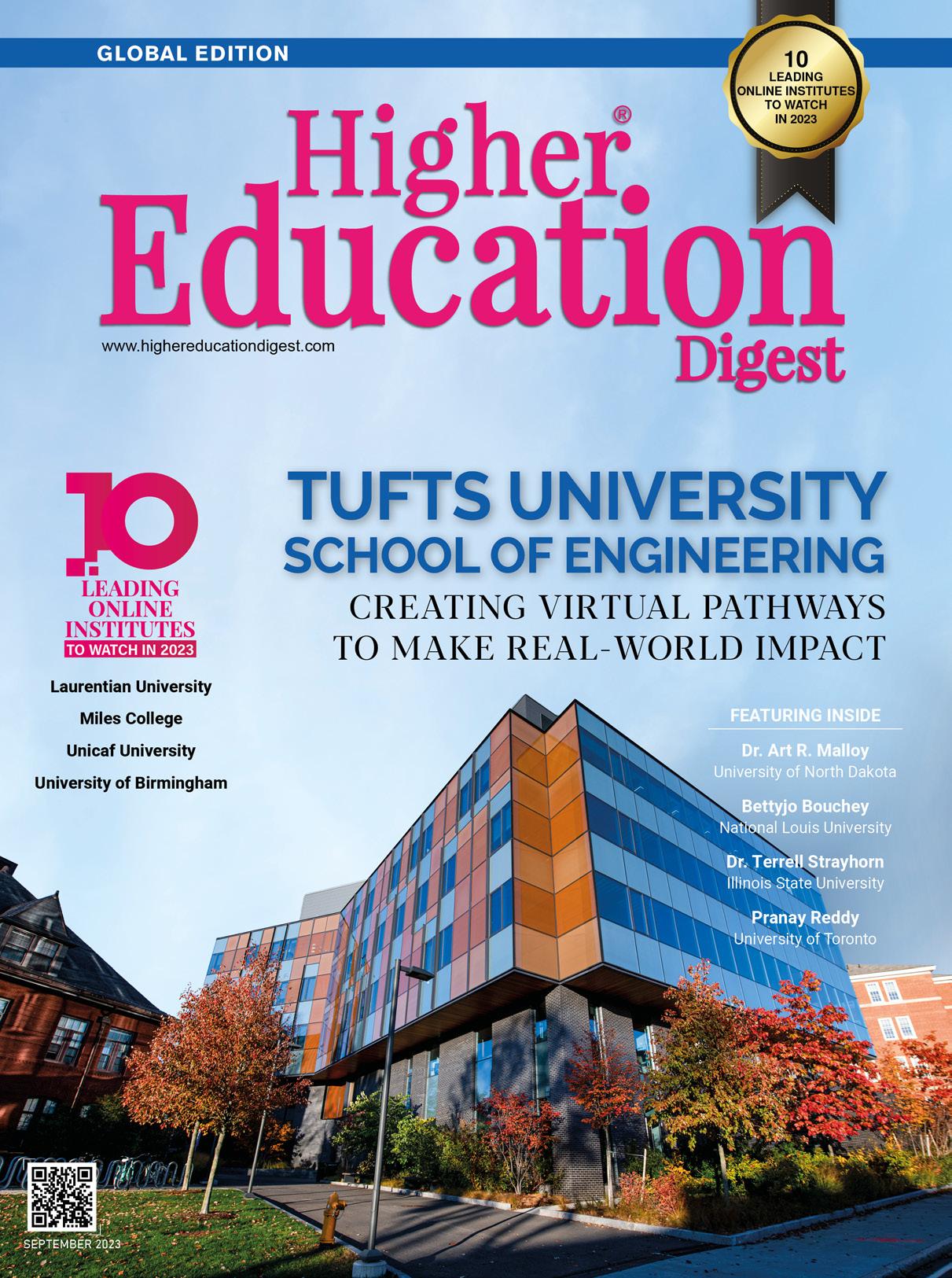




Managing Editor
Sarath Shyam
Consultant Editors
Dr. John Andrews
Emma James
Andrew Scott
Naomi Wilson
Stanly Lui
Joseph Alex
Creative Consultants
Charlie Jameson
Edwards Gonzalez
Branding & Marketing Partnerships
Jennifer Anderson
Alice Smith
Lucy Jones
Anna Elza
Enquiry
admin@highereducationdigest.com
Free Subscription
September 2023 Vol - 5 Issue - 10
Leading Online Institutes to Watch in 2023
International Representation
Americas 16192 Coastal Highway, Lewes, DE 19958, USA
Europe
27, Old Gloucester Street, London, WC1N 3AX, UK
Middle East & Africa P.O. Box 48299, Dubai Silicon Oasis, Dubai, UAE
Asia-Pacific
Ramanashree Arcade, 18 MG Road, Bangalore – 560001, India
Higher Education Digest is a digital magazine published by Connecta Innovation Private Limited. All rights reserved. The opinions expressed in the content and pictures provided are those of the authors. They do not purport to reflect the opinions or views of the Connecta Innovation Private Limited or any of its members and we do not assume any responsibility. The publisher does not assume any responsibility for the advertisements, its content, pictures, and all representation of warranties made in such advertisements are those of the advertisers and not of the publisher.
Higher Education Digest is a Free Subscription digital magazine strictly not for sale and has to be strictly for internal private use only. Publisher does not assume any responsibility arising out of anyone printing copy of this digital magazine in any format and in any country and all matters related to that.

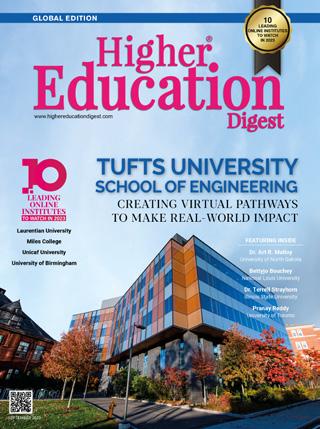
4 Higher Education Digest September 2023
Global Horizons of Knowledge: Navigating the Perfect Online Institution
In the fast-paced and interconnected world of the 21st century, online education has emerged as a transformative force, revolutionizing the way people access knowledge and skills. Its importance lies in its ability to break down geographical barriers, making education accessible to a diverse and global audience. Online education offers unparalleled flexibility, allowing learners to customize their learning experiences to suit their schedules, preferences, and individual learning styles. Whether it’s pursuing a degree, learning a new language, or acquiring technical skills, online education opens up a vast array of opportunities for personal and professional growth.
However, with the plethora of online institutions available worldwide, the process of choosing the right one becomes crucial. The perfect online institution not only offers high-quality courses but also provides the necessary support and resources to ensure a fruitful educational journey. Accreditation and credibility are paramount factors to consider, as they validate the institution’s academic standards and ensure that your efforts lead to recognized qualifications. Moreover, finding an institution with experienced and dedicated instructors fosters an enriching learning environment, promoting meaningful interactions and knowledge exchange.
To simplify this process, we have carefully curated a list of 10 Leading Online Institutes to Watch. This list is a valuable resource, providing students with reputable institutions that meet high academic standards. With a diverse range of disciplines and programs, students can pursue their passions and find the perfect institute to nurture their talents. The featured institutes offer flexibility and accessibility, enabling students to learn at their own pace and from anywhere in the world. By embracing innovation and technology, these institutions provide dynamic and interactive virtual learning experiences. Most importantly, they equip students with practical and up-to-date expertise, empowering them for successful and fulfilling careers.
On the cover, we feature Tufts University situated amidst the vibrant academic landscape of Greater Boston. Spanning back to its inception in 1852, Tufts has been an ardent cultivator of exceptional minds, fostering their growth in diverse fields and equipping them for lives of leadership and unending learning.
A bastion of this tradition, the Tufts University School of Engineering emerges as a crucible for molding the leaders and innovators of tomorrow, propelling technological advancements to serve the greater good.
Enjoy Reading.
Sarath Shyam

5 Higher Education Digest September 2023
MANAGING EDITOR’S NOTE
TUFTS

UNIVERSITY SCHOOL OF ENGINEERING
Creating Virtual Pathways to Make Real-world Impact
6 Higher Education Digest September 2023 CONTENTS
COVER STORY 10








7 Higher Education Digest September 2023 LAURENTIAN UNIVERSITY Empowering Learners through Flexible Online Education 34 UNICAF UNIVERSITY Igniting Education Beyond Boundaries and Cultivating Tomorrow’s Trailblazers 68 MILES COLLEGE Offering Future-Focused Education Transcending the Boundaries 54 UNIVERSITY OF BIRMINGHAM To Explore the World of Online Education with Flexibility, Quality, and Success 82
MENTOR’S MANTRA
ACADEMIC VIEW
ARTIFICIAL INTELLIGENCE & HIGHER ED: WHAT LIES AHEAD?
Bettyjo Bouchey, Associate Professor & Vice Provost, Digital Strategy and Operations, National Louis University
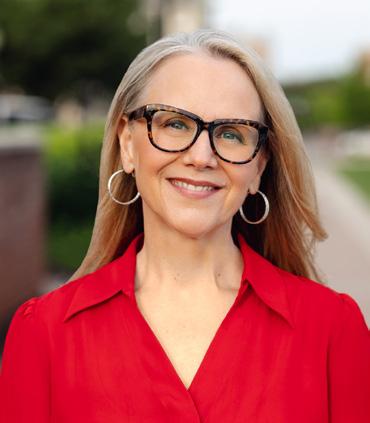

LEVERAGING ARTIFICIAL INTELLIGENCE (AI) IN POST-SECONDARY CAREER ADVISING
Pranay Reddy, MEd Candidate at Ontario Institute for Studies in Education at the University of Toronto


8 Higher Education Digest September 2023
CONTENTS 50
24
ACADEMIC VIEW
TRANSFORMING LIVES THROUGH THE STUDENT EXPERIENCE



WORKPLACE BELONGING IN HIGHER EDUCATION

9 Higher Education Digest September 2023
62
92
Dr. Art R. Malloy, Vice President - Student Affairs, University of North Dakota
Dr. Terrell Strayhorn, Professor of Higher Education; Women’s & Gender & Sexuality Studies at Illinois State University
TUFTS UNIVERSITY SCHOOL
OF ENGINEERING Creating Virtual Pathways to Make Real-world Impact

COVER STORY
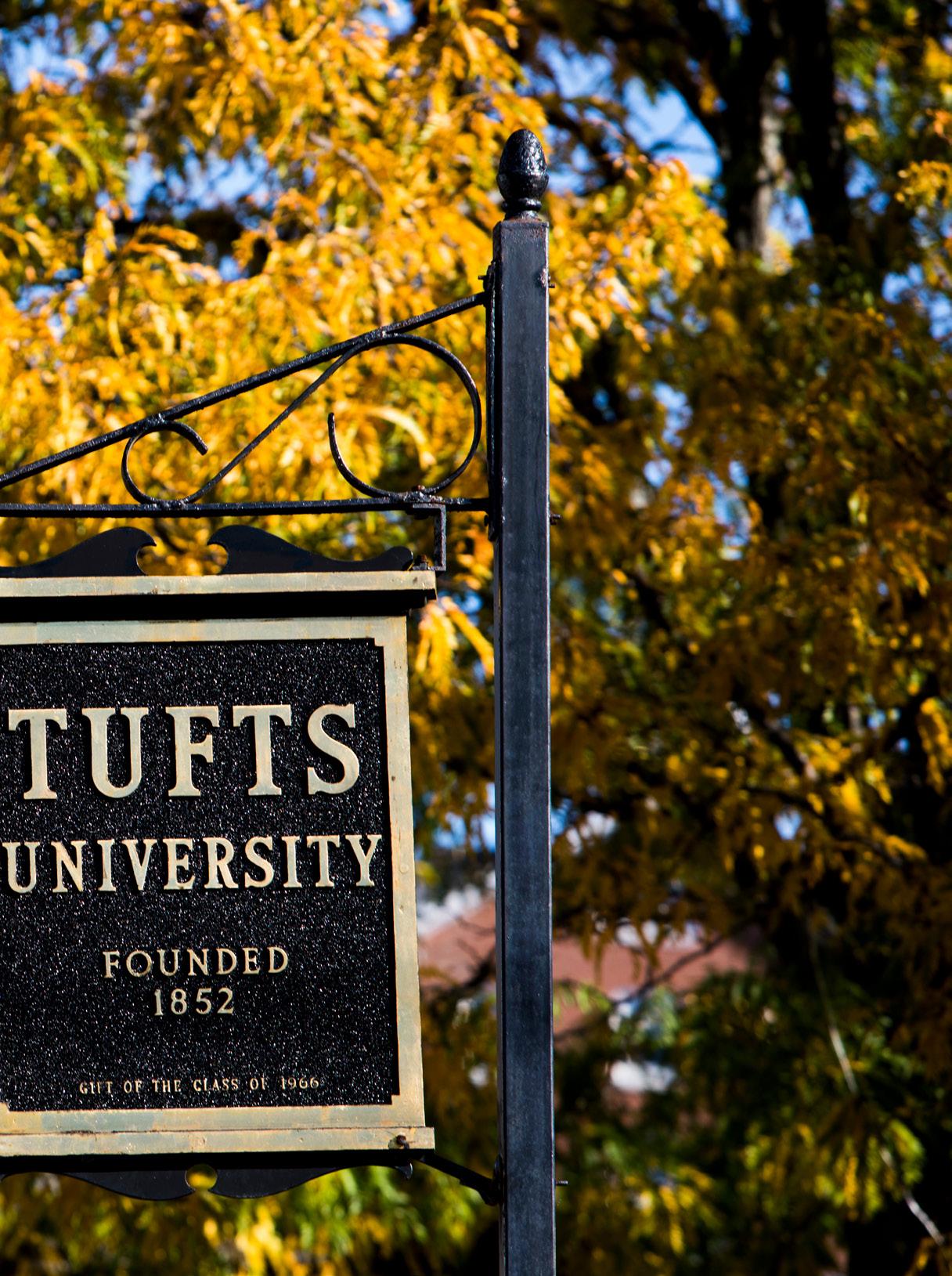
Higher Education COVER STORY
Situated amidst the vibrant academic landscape of Greater Boston, Tufts University stands as a beacon of educational excellence that marries the intimacy of a close-knit community with the bountiful resources of a premier research institution. With campuses
strategically nestled in proximity to bustling city opportunities, Tufts offers the quintessential university experience. Spanning back to its inception in 1852, Tufts has been an ardent cultivator of exceptional minds, fostering their growth in diverse fields and equipping them for lives of leadership and unending learning.

12 Higher Education Digest September 2023
A bastion of this tradition, the Tufts University School of Engineering emerges as a crucible for molding the leaders and innovators of tomorrow, propelling technological advancements to serve the greater good. “At Tufts University School of Engineering, whether you’re pursuing studies on our campus or through our online programs, the

caliber and significance of your degree remain unwavering,” says Karen Panetta, Professor and Dean of Graduate Education for the School of Engineering. The core ten-course curriculum steadfastly holds its ground, guaranteeing an equitable and robust academic experience for all, both on-campus and online learners.
Within the rich tapestry of the School of Engineering’s offerings, seven online programs illuminate the realm of modern education:
1. Master of Science in Computer Science (MSCS): This comprehensive online program delves deep into the world of computer science, spanning core principles to practical applications. Within a span of less than two years, students acquire proficiency in problem-solving and programming, traversing ten courses (equating to
13 Higher Education Digest September 2023
Tufts University’s educational ethos
is one of embracing interdisciplinary fusion, recognizing that the true beauty of science flourishes when cultivated across diverse fields
“We want students who, once they leave Tufts, are guided by more than just the demands of the marketplace,” says Associate Teaching Professor Marty Allen, director of online computer science programs at Tufts.
Tufts University extends an array of flexible learning options, blending asynchronous and synchronous formats to cater to diverse student preferences
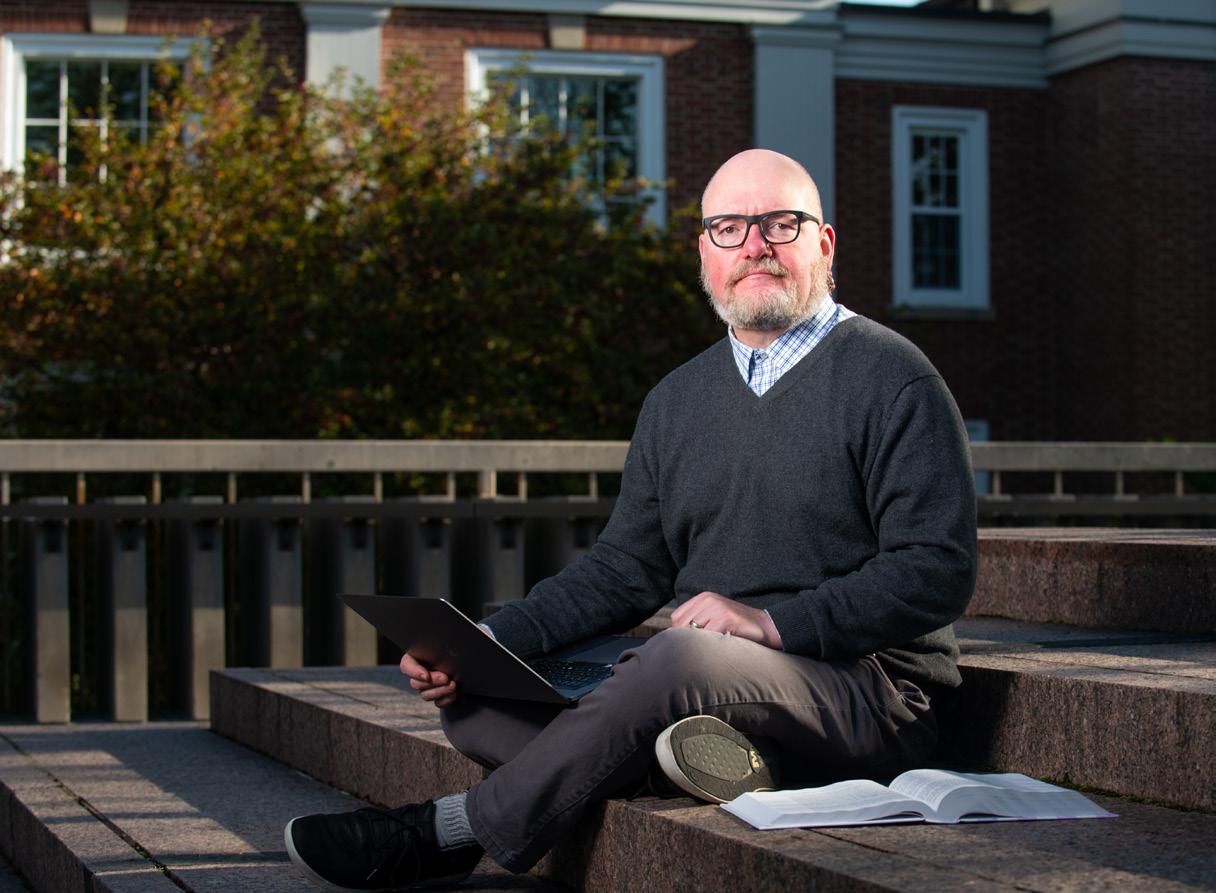
14 Higher Education Digest September 2023
33 credits) that span the gamut of essential theory and hands-on practice.
2. Master of Science in Data Science (MSDS): Catering to the burgeoning field of data science, this online program prepares students for careers across diverse industries. Focused on principles, methodologies, and practices of data analysis, the program synergizes across disciplines, uniting ten courses (comprising 32 credits) and culminating in a capstone project. The journey, designed for part-time engagement, unfolds over less than two years.
3. Master of Science in Engineering Management (MSEM) – (With optional on-campus immersive experiences):
In a world propelled by technology, this online program nurtures leadership prowess in STEM professionals. Delivered flexibly over the course of around two years (part-time), MSEM provides the tools for navigating complex, technologydriven landscapes and stands as an ideal stepping stone for graduates aspiring to ascend the leadership ladder.
4. Post-Baccalaureate Certificate in Computer Science (PB Cert): Tailored for beginners in the field of computer science, this program lays a sturdy foundational framework (encompassing 17-23 credits) for embarking on new career trajectories.
5. Master’s Track: Post Baccalaureate Certificate in Computer Science to MS in Computer Science: Serving as a bridge to a Master’s in Computer Science, this track welcomes newcomers to the realm of computing. Paving the way with a 7-credit prelude, the
program seamlessly transitions participants into the master’s program, culminating in a transformative degree within a year.
A symphony of programming, mathematical problem-solving, and professional development threads through the curriculum, creating a holistic educational experience. The master’s track, akin to a crescendo, offers a swift passage to attainment, with completion within a mere year. Collectively, these programs unfold a myriad of online learning avenues in engineering and computer science, catering to diverse levels of expertise and career aspirations—bridging geographical boundaries.
6. MS in Technology Management and Leadership: Technology Management & Leadership (MSTML) program, designed for ambitious professionals, offers a strategic blend of skills and mindset to navigate the complexities of technology management and spearhead transformative change. Whether one holds a role in product management, data analysis, consulting, or research, MSTML fosters the confidence to advance in the tech sector’s leadership landscape. With the option of 100% online learning or immersive experiences at Tufts campus, MSTML provides a flexible and impactful educational journey for aspiring tech leaders.
7. Human Factors in Medical Devices and Systems: Guided by the directive of the FDA, Human Factors in Medical Devices and Systems elucidates the seamless integration of Human Factors Engineering into the device development process. Participants will equip themselves with expertise that’s in high demand within the evolving medical landscape. The program accommodates the schedules of working professionals and students, with thoughtfully
15 Higher Education Digest September 2023
scheduled evening classes. Moreover, the acquired credits can seamlessly pave the way for a master’s degree in the realm of human factors engineering. By enrolling in this course, participants have the opportunity to elevate the standard of patient care, revolutionize medical technology, and emerge as catalysts for a safer healthcare environment.
Embracing the Power of Interdisciplinary Fusion
Tufts University’s educational ethos is one of interdisciplinary fusion, recognizing that the true beauty of science flourishes when cultivated across diverse fields. Curricula at Tufts weave together a rich tapestry of disciplines, encompassing the realms of software engineering, machine learning, artificial intelligence, database systems, cybersecurity, big data, algorithms, programming languages, and beyond.
“We champion adaptability by allowing both MSCS and MSDS students to traverse courses from both programs. This approach ensures a well-rounded education that resonates with every student,” elucidates Associate Teaching Professor Marty Allen, the guiding force behind Online Programs in Computer Science and Data Science at Tufts University School of Engineering.
Students thrive in this environment mirroring real-world demands for computer science prowess. The Department of Computer Science at Tufts pioneers interdisciplinary pursuits, exemplified by its bridge professorships in cognitive science and cybersecurity and policy. Allen expounds, “Our academic blueprints and research endeavours span many arenas, ranging from human-computer interaction and computational biology to cognitive and brain
science, data science, human-robot interaction, and far beyond.”
Armed with a robust foundation and exceptional skill set in computer science, Tufts graduates embark on their journeys with confidence. Core courses such as Machine Structure and Assembly-Language Programming, Programming Languages, Algorithms, and Theory of Computation fortify their prowess as adept problem solvers. These bedrock courses seamlessly intertwine with enriching upper-level classes, a stage where world-renowned experts pave the way.
“Our commitment to excellence drives us to perpetually fine-tune and rejuvenate our course

16 Higher Education Digest September 2023
Beyond the virtual classroom, Tufts ensures its online students access to comprehensive career services, extending opportunities well beyond graduation

content, ensuring that our students remain aligned with the forefront of computer science innovation throughout their academic tenure. Our faculty keeps pace with evolving trends, curating a curriculum not merely for immediate job success, but for the dynamic careers that lie ahead. As new technologies are developed our teachings adapt accordingly,” Allen affirms.
At Tufts University, the journey through computer science is one of perpetual exploration, adaptation, and growth. Through interdisciplinary confluence and an unwavering commitment to excellence, Tufts paves the way for its students to become not just adept graduates, but pioneering architects of the digital future.
Education
17
Flexibility and Personalized Support at the Forefront
Tufts University extends an array of flexible learning options for students in online programs, blending asynchronous and synchronous formats to cater to diverse student preferences. Live Zoom sessions, typically held twice a week during evening hours in Eastern Standard Time, foster real-time interaction and collaboration among students.
“Zoom has proven instrumental, enabling a flipped classroom approach and fostering invaluable connections among peers. Upon
enrolling in classes, students receive a 15-week schedule for the entire term,” underscores Dean Panetta. This structured approach is designed to enhance the overall learning experience.
A cornerstone of Tufts’ online education is the requirement for students to complete their independent assignments before each weekly class. This methodology empowers students to actively engage during class discussions and activities, extracting maximum value from their academic journey.
The online learning experience weaves together innovative technology, meticulously
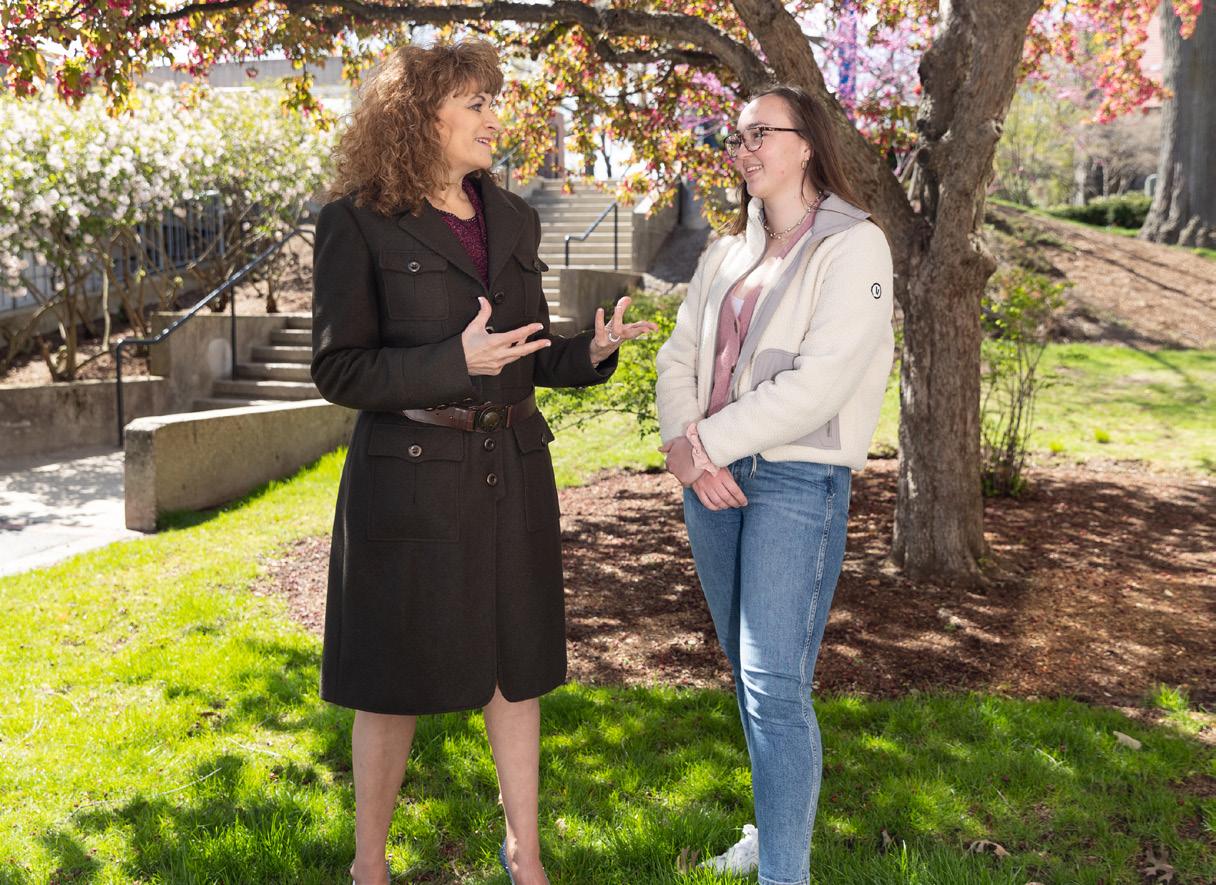
18
Dean of Graduate Education Karen Panetta, left, with MS student Jessica Nordlund, right. Dean Panetta was recently named to the National Academy of Engineers — an exceptional honor for U.S. engineers.
crafted curricula, and robust partnerships, all aimed at preparing students for impactful careers. “Given that many of our students are working professionals with full-time jobs and family commitments, individual projects are a popular choice due to time constraints. While internships are available, they are less common among online students who are often already employed,” adds Dean Panetta.
Tufts prioritizes comprehensive student support. From dedicated student success coaches and teaching assistants to faculty office hours and personalized academic advising by the program
Tufts’ robust alumni network frequently opens doors to fulfilling career paths, underscoring the enduring connections forged by Tufts graduates
director, a rich ecosystem of assistance is readily available. Live classes often include breakout groups for specific projects. “Our commitment to community is strong, and we encourage nearby students to make use of our campus facilities whenever needed. Student success is our lodestar, and we stand by them every step of the way,” underscores Dean Panetta.
In the journey through coursework and fieldwork experiences, students can expect personalized attention, enriched by an intimate learning environment and a low student-toinstructor ratio. The university bolsters this by providing 24/7 tech support and virtual openoffice hours, ensuring students receive the guidance they require directly from faculty. “We recognize the significance of fostering enduring professional and personal connections among fellow students and future colleagues. Thus, our online programs emphasize collaboration, group work, and a sense of camaraderie within our virtual classrooms,” says Dean Panetta.
Beyond the virtual classroom, Tufts ensures its online students access to comprehensive career services, extending opportunities well beyond graduation. “Our remarkable alumni network proves invaluable, connecting students with industry professionals and exciting career paths. Online students can participate in on-campus career fairs hosted by Tufts alumni, especially if they are in the vicinity,” shares Dean Panetta.
Tufts’ robust alumni network frequently opens doors to fulfilling career paths, underscoring the enduring connections forged by Tufts graduates.
The Prerequisites
The Master of Science in Computer Science (MSCS) program at Tufts University seeks individuals with robust programming prowess in
19 Higher Education Digest September 2023
In the realm of academia, Tufts University School of Engineering stands as a beacon of opportunity, catering to both on-campus and online students
languages such as C++ and Python, coupled with a penchant for mathematics. Preferably, candidates possess a background in Computer Science, either as a major or minor, or have relevant work experience that involves coding. For those who find themselves lacking a foundation in Computer Science or Mathematics, the program offers an ideal segue through PB/MS or PB certificate programs, effectively bridging the gap to MSCS.
Upon completing two or three undergraduate courses, students in the PB program are presented
with a pivotal crossroads: the choice between pursuing a master’s degree or undertaking a graduate-level certificate. This flexible approach empowers learners to tailor their academic journey to their individual aspirations and circumstances, ensuring a seamless transition into advanced studies.
The Master of Science in Data Science program charts its course for individuals possessing a bachelor’s degree in a STEM field. This encompasses a spectrum of disciplines, from Mathematics and Science to Engineering and Computer Science, or
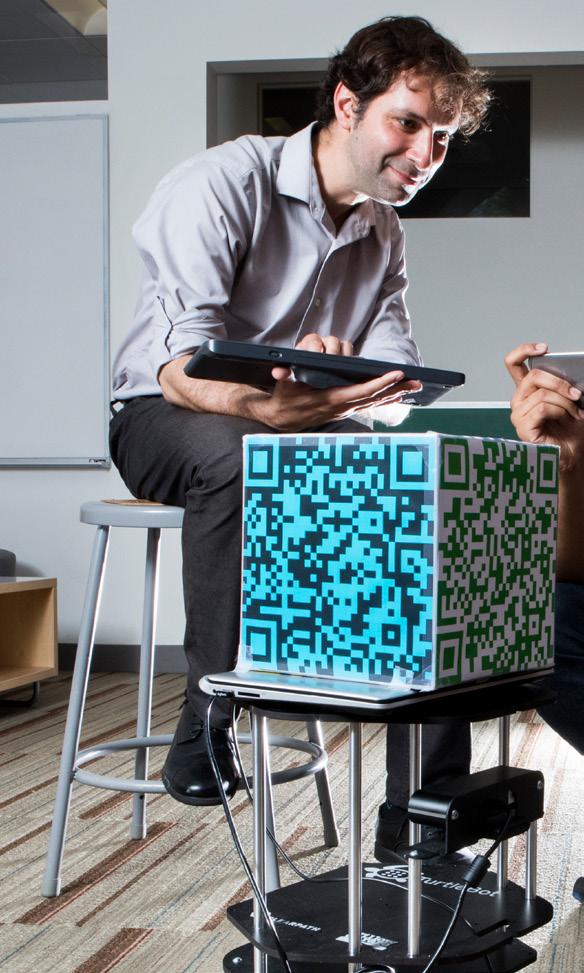
20 Higher Education Digest September 2023
any related field. However, students whose academic backgrounds diverge from STEM must demonstrate an aptitude for Mathematics, underlining its significance as a cornerstone for success in the data-driven realm.
Tufts University’s programs are carefully curated to accommodate diverse profiles and aspirations, ensuring that every student, regardless of their academic background, finds a pathway to thrive and excel. The School of Engineering lives the values of excellence, inclusion, and belonging through scholarship, teaching and mentoring, and civic engagement.
The Department of Computer Science strongly supports Tufts student groups like Women in Computer Science and Black Students in Computer Science. Many Tufts students elect to participate in active campus chapters of national affinity organizations for engineers, including the National Society of Black Engineers, Out in STEM, the Society of Latinx Engineers and Scientists, and the Society of Women Engineers.
Diverse Funding Avenues for Online Excellence
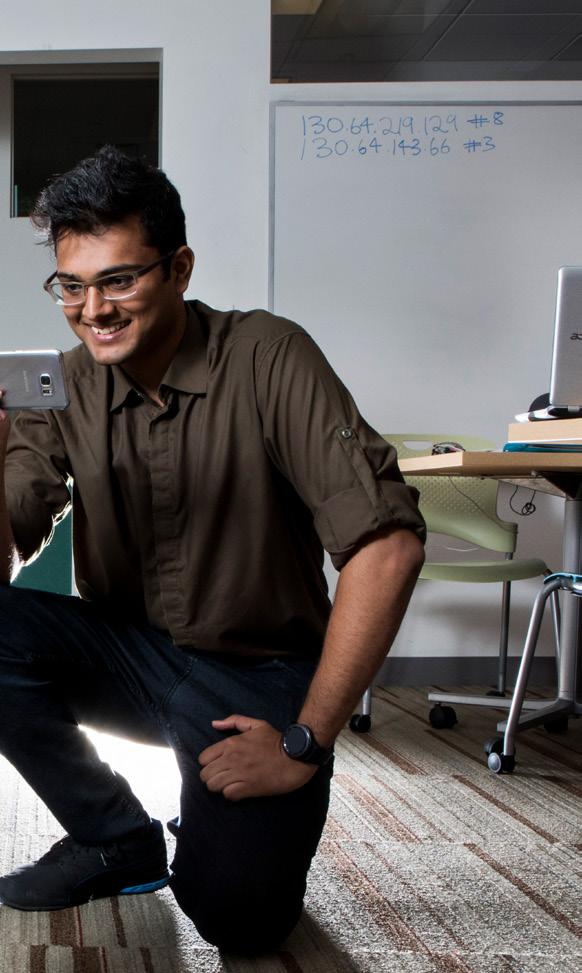
Recognizing the substantial financial commitment that graduate education entails, Tufts University stands committed to supporting its online students through an array of funding channels. “At Tufts, we understand the financial commitment that pursuing a graduate program involves,” affirms Dean Panetta.
One avenue for financial support is through the alumni scholarship. Returning alumni to Tufts School of Engineering can pursue their MS degrees at a reduced tuition rate. Through the Double Jumbo Scholarships, alumni stand to gain a suite of benefits, including a 20% tuition discount, a waiver of graduate application fees, and a streamlined process requiring only two letters of recommendation instead of the customary three.
Tufts School of Engineering also extends a fast-track journey to a master’s degree for undergraduate STEM majors and alumni from designated institutions (Lafayette College, Olin College, Smith College, Union College, and Wellesley College). This pathway offers a 20% tuition scholarship, coupled with a simplified application process, streamlining
21 Higher Education Digest September 2023
the transition from undergraduate to graduate pursuits.
Veterans enrolled in the School of Engineering find solace in the Yellow Ribbon Scholarship, currently awarding an annual sum of $5,000. Additional details about this scholarship can be found on the U.S. Department of Veterans Affairs website.
Furthermore, Tufts School of Engineering allocates a limited number of merit-based scholarships to online students each semester. As
part of the application review process, applicants are considered for both scholarships and program admission simultaneously. A distinct scholarship application is not required. This merit-based scholarship, covering 10% of tuition for each semester, underscores Tufts’ commitment to supporting its students’ academic journeys. It’s important to note that this scholarship cannot be deferred to a future term and cannot be combined with other Tufts University scholarships, with the exception of the Yellow Ribbon.

Education
22
Fostering a culture of collaboration and camaraderie, Tufts actively encourages students to embrace office hours, form study groups, and connect with peers
Beyond these avenues, Tufts students delve into a spectrum of financial resources, such as employer tuition assistance or reimbursement, federal student loans, and private loans, ensuring a comprehensive approach to funding their educational pursuits. With a commitment to accessibility and excellence, Tufts University ensures that financial considerations do not hinder the pursuit of academic brilliance.
Expanding Horizons
In the realm of academia, Tufts University School of Engineering stands as a beacon of opportunity, catering to both on-campus and online students. For those within the physical confines of the campus, full-time programs offer daily interactions with esteemed faculty members. Online students engage in parttime studies, benefiting from several faculty
meetings each week. This dual approach ensures that faculty engagement remains a cornerstone, regardless of the chosen path.
Fostering a culture of collaboration and camaraderie, Tufts actively encourages students to embrace office hours, form study groups, and connect with peers. The availability of Tufts’ facilities adds another layer of resourcefulness for those nearby, enhancing their academic experience.
Tufts’ commitment extends to both oncampus and online students, crafting unique avenues for engagement with faculty and peers. This commitment shapes a vibrant academic environment where each student becomes an integral part of Tufts’ legacy. Looking ahead Tufts School of Engineering is posed to expand its online offerings in the future, ushering in a new era of opportunities across digital horizons.

23 Higher Education Digest September 2023
MANTRA
Artificial Intelligence & Higher Ed: What Lies Ahead?
Bettyjo Bouchey, Associate Professor & Vice Provost, Digital Strategy and Operations, National Louis University
Dr. Bouchey is Associate Professor and Vice Provost of Digital Strategy and Operations at National LouisUniversitywheresheisresponsibleforstandards of quality and service for online programming across the institution, alternative graduation pathways, learning experience design, and academic innovation, overall. Dr. Bouchey holds a B.A. in Psychology from the University at Albany, an M.B.A. in Entrepreneurship from Rensselaer Polytechnic Institute, and a Doctorate in Education from Northeastern University. Her research interests include the nature and future of organizational structures of online units in institutions of higher education, as well as inventive and highimpact pedagogical practice in online teaching, inclusive of artificial intelligence and machine learning. Dr. Bouchey writes and is widely quoted in the academic and popular press.

Higher Education Digest
MENTOR’S
AI can help deliver data-driven insights into how courses (and students) are performing, and which topics should be focused on or revised
The world of higher education is rapidly evolving, and technology has played an important role in that process. Technology has enabled educators to teach, learn, and collaborate with students in new ways, including opening the walls of the classroom to digital and online education. One recent, exciting innovation at the intersection of technology and education is ChatGPT, which leverages artificial intelligence (AI) and has the potential to transform teaching and learning.
ChatGPT stands for “chat generative pretrained transformer.” This AI system uses natural language processing to generate language in response to prompts or questions,
much like humans having a dialog. ChatGPT, developed by a collaboration between Microsoft Research Asia and Peking University, uses AI to automate interactions between people and computers. Unlike its cousins Amazon’s Alexa or Apple’s Siri, this tool doesn’t ask for information—it simply learns from every dialogue in order to provide increasingly accurate responses. Although a who’s who of technology leaders is calling for a 6-month pause on AI training to give the world some time to catch up, there is little doubt that AI is here to stay.
Many of us in higher education have begun to imagine a world where some of the administrative tasks associated with teaching
25 Higher Education Digest September 2023
AI can help deliver data-driven insights into how courses (and students) are performing, and which topics should be focused on or revised

26 Higher Education Digest September 2023
and learning could be accomplished (dare I say offloaded?) through the use of AI. One such task is wraparound student support. Intelligent agents added to data-informed student support models could identify at-risk student behaviors more quickly than a human with a data model could. This would free up advisors and other student support employees to intervene with individual students in thoughtful and informed ways. AI can help deliver data-driven insights into how courses (and students) are performing, and which topics should be focused on or revised. This data can be used by faculty and administrators to improve overall course quality and ensure students receive the best possible education.
Other critical student support systems could be scaffolded with AI. Automating statuses related to financial aid and generating scholarships that match details in financial aid applications would reduce the cost of an academic journey. Incoming students could upload a resume or answer questions about their previous work and life experiences so an AI tool could identify credit for prior learning in a more cost-effective way as well. Using AI to address the increasing pressure on the cost of higher education is a unique opportunity not only for students, but also for higher education to address rising costs as well.
AI could also help with time management for faculty. Uploading content or a course syllabus into a chatbot could reduce the need for oft-asked questions related to the course (e.g.,
when is the assignment due this week?). It could also help students find additional materials that augment the course or are at higher or lower taxonomies, as needed. In addition, commonly asked questions could be used to generate course improvement ideas and recommendations related to those improvements. Faculty and students could agree to use AI to generate more feedback on assignments and thereby increase the chances for student success without the correspondent increase in faculty workload.
Finally, AI could help with personalized learning. Online learning experiences could be made more interactive and engaging with the help of ChatGPT, allowing students to ask detailed questions about a topic for quick responses in real time. Personalized tutoring is achievable by having ChatGPT explain topics differently and perhaps through different modes as well (e.g., videos instead of text). If one explanation doesn’t make sense for a student, ChatGPT could provide another that may better explain what’s being taught to that individual student and to their learning preferences. As an added benefit, an AI tutor would not experience fatigue as human tutors would.
Opportunities notwithstanding, there are many outstanding questions and potential downsides to the use of AI in teaching and learning that we must also attend to. These are related to the call for the pause on AI training by the likes of Elon Musk and Steve Wozniak. For

27 Higher Education Digest September 2023
us in higher education, some of the chief questions relate to ownership and copyright. If a tool like ChatGPT formulates a poem, for example, who owns it—the machine or the human who published it? Further, because most of these AI tools are trained only on information openly available on the internet, the chance of spreading inaccurate information, even disinformation, is very high. Rampant bias in generated responses has been reported because these systems cannot access information located behind a login or paywall, such as peer-reviewed materials and textbooks written by vetted and more objective experts.
Moreover, the use of AI in writing calls into question the value of written assignments in higher education. While many educators have long lauded the value of multimodal learning environments that enable students to write, record, or draw to demonstrate their understanding of a key concept, the domination of writing in higher education cannot be understated. We don’t yet know how AI will disrupt our current assessment strategies, but it clearly is time to evaluate those notions.
AI and applications such as ChatGPT are truly revolutionary technology that can and will shift the teaching and learning landscape and higher education in general. Despite our incomplete understanding of the long-term benefits and consequences, AI will take center stage in the future of higher education. With all of this in mind, we must be listening, experimenting, and evaluating how AI will impact higher education today and into the future.
28 Higher Education Digest September 2023
AI can help deliver datadriven insights into how courses (and students) are performing, and which topics should be focused on or revised



29 Higher Education Digest September 2023 © 2022 Turnitin LLC. All rights reserved. www.turnitin.com Inspire student success. Deliver actionable feedback, faster with Turnitin Feedback Studio. Discover more at www.turnitin.com/products/feedback-studio
École Polytechnique Fédérale de
Lausanne (EPFL)
Keio University

Website:
Website: Location: Lausanne, Switzerland
Admission Portal Link:
https://www.epfl.ch/ https://www.epfl.ch/education/admission/

Location: Tokyo, Japan
Admission Portal Link:
https://www.keio.ac.jp/en/ https://www.sfc.keio.ac.jp/en/admissions/
30 Higher Education Digest September 2023
Laurentian University
Website:
https://www.laurentian.ca/
Location: Sudbury, Ontario, Canada
Admission Portal Link:
https://laurentian.ca/how-to-apply

Miles College
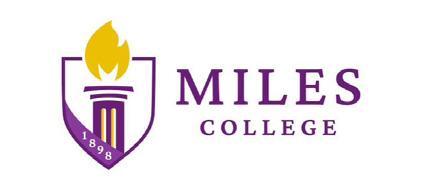
Website:
https://www.miles.edu/
Location: Fairfield, Alabama, USA
Admission Portal Link:
https://www.miles.edu/admissions-aid
Technische Universität München (TUM)
Tufts University School of Engineering
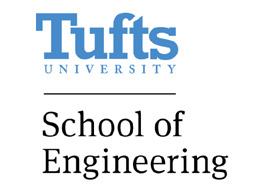
Website:
https://www.tum.de/en/
Location: Munich, Germany
Admission Portal Link:
https://www.tum.de/en/studies/application/
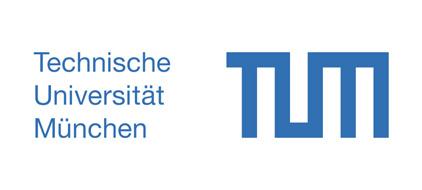
Website:
https://engineering.tufts.edu/
Location: Massachusetts, USA
Admission Portal Link:
https://engineering.tufts.edu/about/contact
31 Higher Education Digest September 2023
Unicaf University
Website:
University of Birmingham
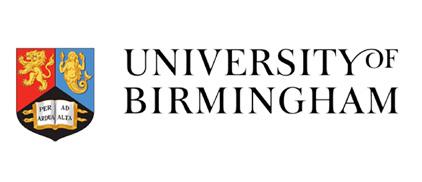
https://unicafuniversity.com/ https://www.birmingham.ac.uk/
Location: Larnaca, Cyprus
Admission Portal Link:
https://unicafuniversity.com/admission-criteria/
Website:
Location: Birmingham, United Kingdom
Admission Portal Link:
https://www.birmingham.ac.uk/study

University of Melbourne
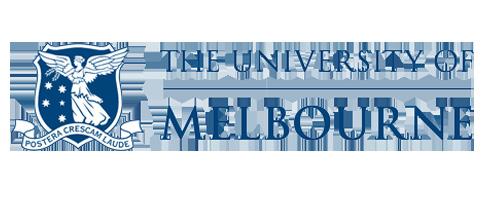
University of Waterloo
Website:
https://www.unimelb.edu.au/
Location: Melbourne, Australia
Admission Portal Link:
https://study.unimelb.edu.au/how-to-apply
Website:
https://uwaterloo.ca/

Location: Waterloo, Ontario, Canada
Admission Portal Link:
https://uwaterloo.ca/future-students/ undergraduate/admissions
32 Higher Education Digest September 2023
Lead your institution through the new normal and beyond
Today’s learners and faculty have high expectations, requiring an integrated and exible learning experience that operates seamlessly and intuitively. By partnering with Blackboard, you can enhance your institution’s brand by providing students and faculty with a holistic and integrated modern learning ecosystem.
Blackboard brings together the technologies and services you need to lead your institution through this digital transformation.
GLOBALBESTPRACTICES
LEARNINGAPPROACH RESULT INTEGRATED
EFFECTIVETEACHING
MEASUREMENT TECHNOLOGIES
To learn more, visit blackboard.com

33 Higher Education Digest September 2023
&
LAURENTIAN UNIVERSITY

Empowering Learners through Flexible Online Education
Laurentian University’s Centre for Continuing Education and Part-time Studies (CCE) has a rich history, dating back to its establishment as the Extension Division in 1960. Its mission has always been to provide high-quality lifelong learning opportunities to residents of Northeastern Ontario and beyond. Dr. Bettina Brockerhoff-Macdonald, the Director of Continuing Learning, highlights the university’s commitment to accessible education and the online program’s role in fulfilling this commitment. She states, “Our online program builds upon our long-standing commitment to providing lifelong learning opportunities, making education accessible to individuals from all walks of life.”
34 Higher Education Digest September 2023
Today, Laurentian Online offers a wide range of options, including complete degree programs and various certificates. What sets Laurentian Online apart is its commitment to bilingualism and Indigenous focus

Higher Education Digest September 2023
Bettina Brockerhoff-Macdonald, PhD, is the Director of Continuing Learning at Laurentian University. She oversees the development and delivery of online programs and courses, supporting faculty in online teaching. With an Honours B.A. in Comparative Literature, French, and German, an M.A. in German, and a PhD in Human Studies, Bettina brings a strong academic background to her role. Her research interests include reading and resilience strategies, narrative research methods, adult and online education, and second-language acquisition. Bettina has contributed to the field through publications on online course assessment strategies and faculty development initiatives.
She has served in various roles in provincial and national organizations related to distance education. She was a member of the advisory committee to the Board of the Canadian Virtual University (CVU) and later served on the CVU Board of Directors. Bettina has also been involved in executive committees of organizations such as CADE-ACÉD, CNIE-RCIÉ, and CAUCE. She served as the president of OCULL and contributed to the stewardship committee of OUCEL.

36 Higher Education Digest September 2023
Dr. Bettina Brockerhoff-Macdonald Director of Continuing Learning at Laurentian University
ABOUT
In response to the growing demand for flexible education, the Centre for Continuing Education launched its Distance Education program in September 1972. The program aimed to cater to the needs of off-campus students seeking autonomy and self-directed study. It utilized various media such as television broadcasts, audio cassettes, videocassettes, and conferencing methods to deliver course materials. Recognizing the potential of online education,
Laurentian University underwent a significant transformation in 2000, transitioning to fully asynchronous online courses. This shift marked a pivotal moment in the university’s pursuit of accessible education. In 2016, to reflect its modernized approach and expanded offerings, the unit was rebranded as Laurentian Online, now offering 26 diverse degree program options as part of the Centre for Continuing Learning.
Laurentian University’s broad range of programs, including BA, BBA, and MBA degrees, along with its English and French offerings, attract both international students and domestic students working abroad

37
A Wide-Range of Options
“Over the past 50+ years, our distance education program has experienced remarkable growth,” shares Dr. Brockerhoff-Macdonald. From its humble beginnings as a single course, the program has expanded to include an impressive inventory of nearly 400 courses. Today, Laurentian Online offers a wide range of options, including complete degree programs and various certificates. What sets Laurentian Online apart is its commitment to bilingualism and Indigenous focus. “As a bilingual and tri-cultural institution, we offer courses and programs in both English and French, with an Indigenous perspective,” adds Dr. Brockerhoff-Macdonald.
Students enrolled in the distance education program have the opportunity to explore a diverse array of subject areas. The program covers a

38 Higher Education Digest September 2023
The Laurentian Online development and delivery team possesses significant expertise and experience, contributing to numerous research and special projects at local, national, and international levels
comprehensive range of disciplines, from Accounting, Anthropology, and Archeology to Biology, Chemistry, and Computer Science. Additionally, students can delve into fields such as Environmental Sciences, Economics, Education, English, Finance, Forensic Identification, Forensic Science, Geology, Gerontology, History, Human Kinetics, Human Resources, Indigenous Studies, Social Work, Integrated Studies, Law and Justice, Management, Marketing, Mathematics, Nursing, Operations, Philosophy, Physics, Psychology, Sociology, and Statistics. The breadth of options ensures that learners can pursue their academic interests and career aspirations through Laurentian Online.

“We believe in providing a tailored and engaging learning experience for our students,” says Dr. Brockerhoff-Macdonald. Each course

39 Higher Education Digest September 2023
development follows a team approach, ensuring students are fully immersed in the course content. At Laurentian University, students can expect a variety of activities designed to enhance their learning journey, ranging from participating in discussion forums and online quizzes to exploring audiovisual components and completing interactive exercises like H5P. Collaborative group projects, such as creating newspaper articles or producing audio-visual presentations, further enrich the learning experience.
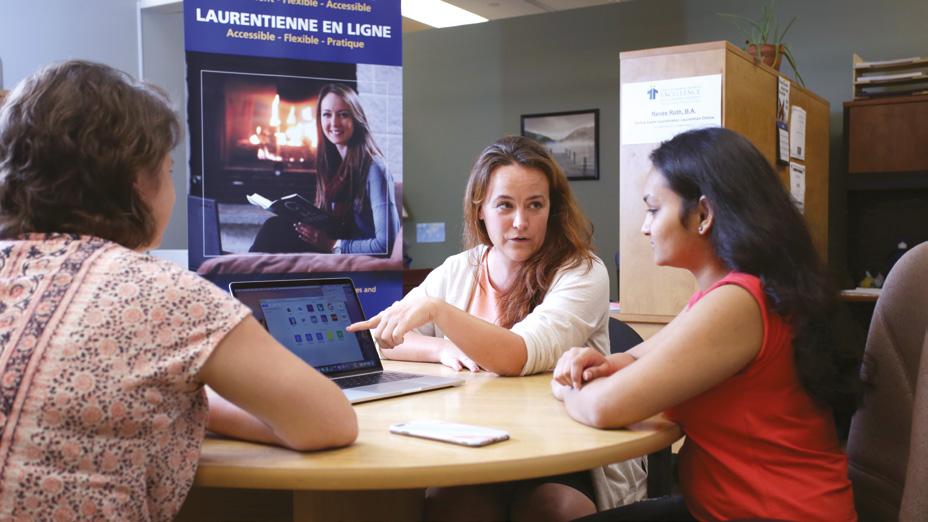
Laurentian University’s broad range of programs, including BA, BBA, and MBA degrees, along with its English and French offerings, attract both international students and domestic students working abroad. This diverse student body represents numerous countries worldwide, with over 600 international students from nearly 70 different countries joining Laurentian University in the 2022-23 academic year.
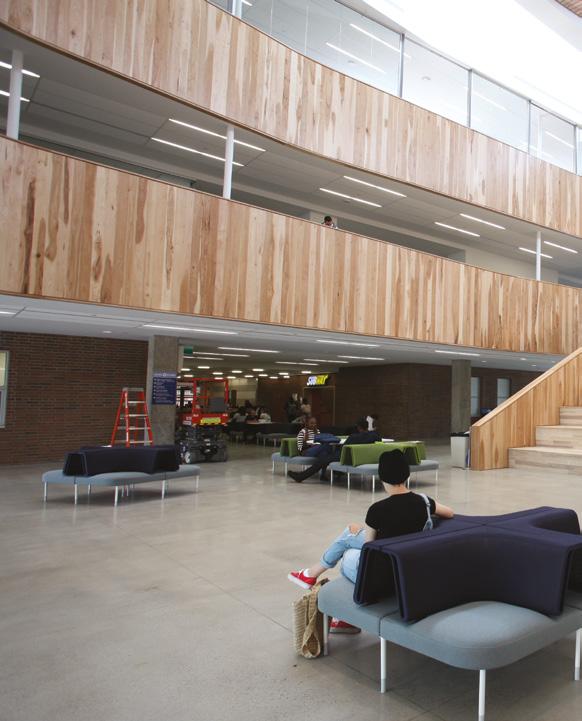
40 Higher Education Digest September 2023
Laurentian Online actively collaborates with industry stakeholders and employers to develop credit micro-credential offerings
“At Laurentian Online, our enrollment continues to increase annually. We prioritize understanding not only what learners want to know but also how they prefer to learn,” emphasizes Dr. Brockerhoff-Macdonald. The lasting impact of the pandemic has led students to seek flexible educational options that seamlessly integrate into their lives. Laurentian University recognizes this need and strives to offer learning opportunities that accommodate diverse schedules and commitments.
Embracing Technology and Pursuing Excellence
“Technology has played a pivotal role in revolutionizing education delivery, particularly
with the widespread adoption of online learning principles,” says Dr. Brockerhoff-Macdonald, Director of Continuing Learning at Laurentian University. The university has been at the forefront of embracing technology in education, quickly transitioning from on-campus to remote learning within 24 hours when the pandemic hit, making it the first Canadian university to do so. Zoom became instrumental in delivering lectures, while Learning Management Systems (LMS) facilitated course content distribution and online assessments.
The faculty at Laurentian University demonstrated remarkable adaptability and resilience in implementing technology-enabled course delivery. The university provided comprehensive support through workshops,
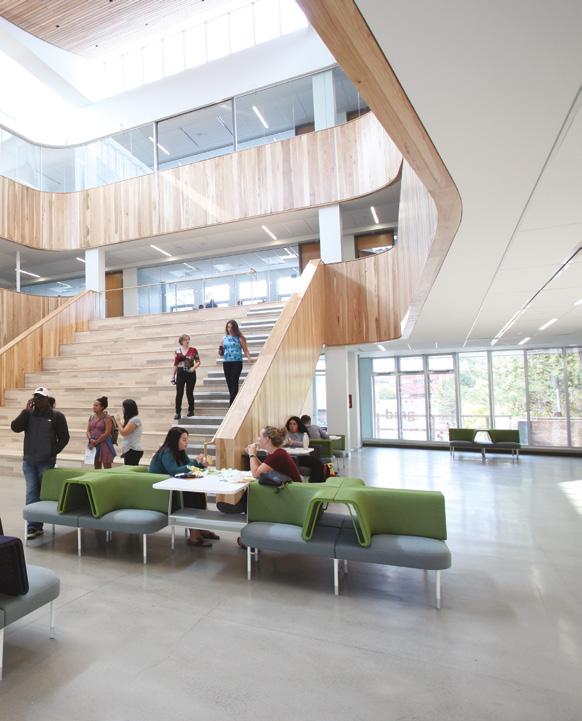
41 Higher Education Digest September 2023
The success of Laurentian Online’s alumni is a testament to the program’s impact. Graduates have pursued diverse educational paths, including medical school, law school, teacher’s college, and Master’s degree programs
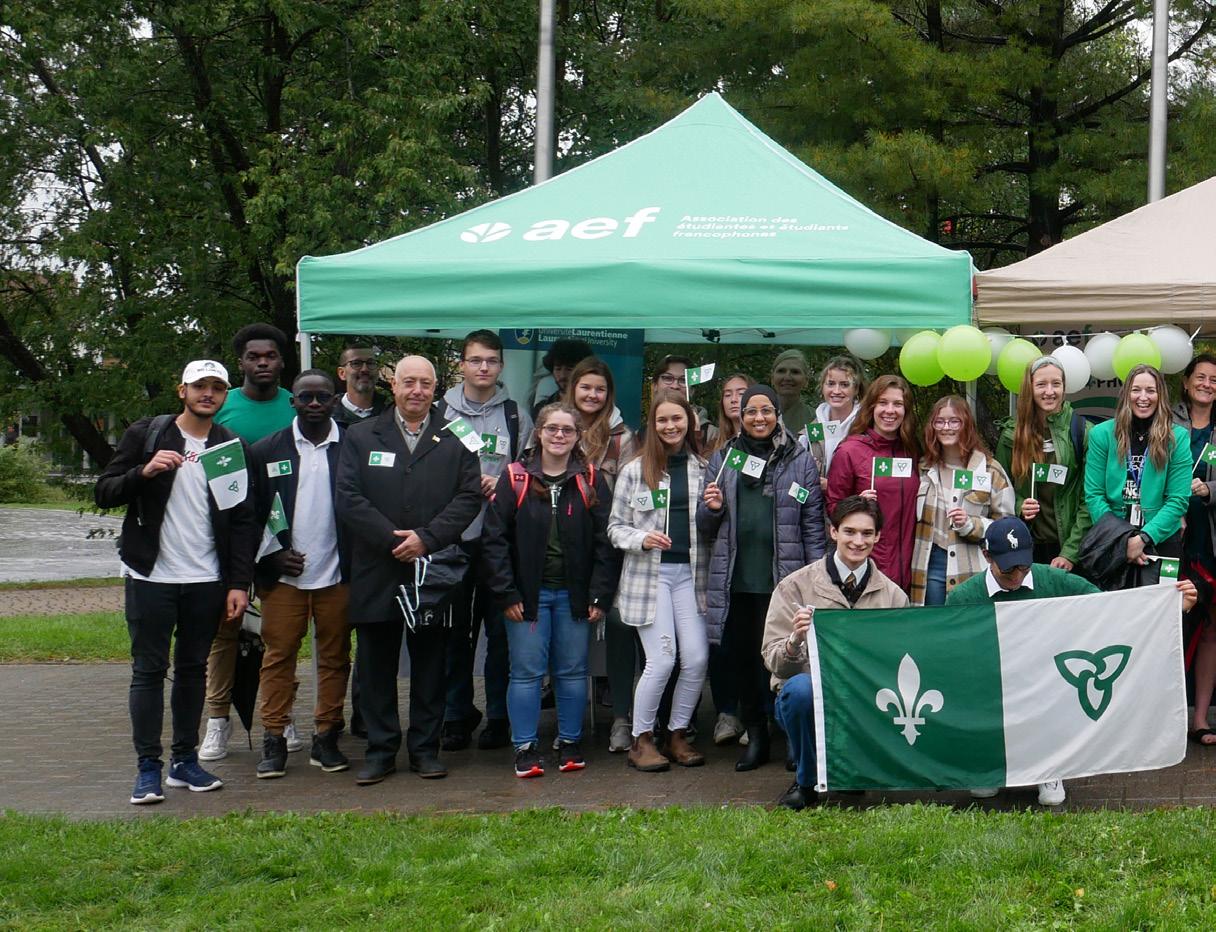
personalized appointments, and the development of resources to guide faculty in effective teaching using educational technology. Dr. BrockerhoffMacdonald emphasizes the university’s rigorous course development process, with each course undergoing peer review by two internal and
external reviewers, ensuring high standards of quality and excellence.
All online courses at Laurentian University are designed to align with the same course learning outcomes as their on-campus counterparts. These courses are developed by faculty members who
Higher Education Digest September 2023
bring extensive expertise in their respective academic fields, professions, or industries. Some course authors may include distinguished individuals, such as Canada Research Chairs or recipients of prestigious research awards. The meticulous approach to course development reflects Laurentian University’s commitment to delivering an exceptional online learning experience. By upholding stringent quality standards, Laurentian ensures that students receive an education of the same academic excellence, whether they study online or on campus.
The Laurentian Online development and delivery team possesses significant expertise
and experience, contributing to numerous research and special projects at local, national, and international levels. Their outstanding work has earned several prestigious awards and national recognitions. Furthermore, the professional programs offered through Laurentian Online, including Indigenous Social Work, Service Social, and the Bachelor of Business Administration, hold full accreditation, equivalent to their on-campus counterparts. This accreditation guarantees that students receive a high-quality education and recognition for their achievements, regardless of their chosen mode of study. All courses and
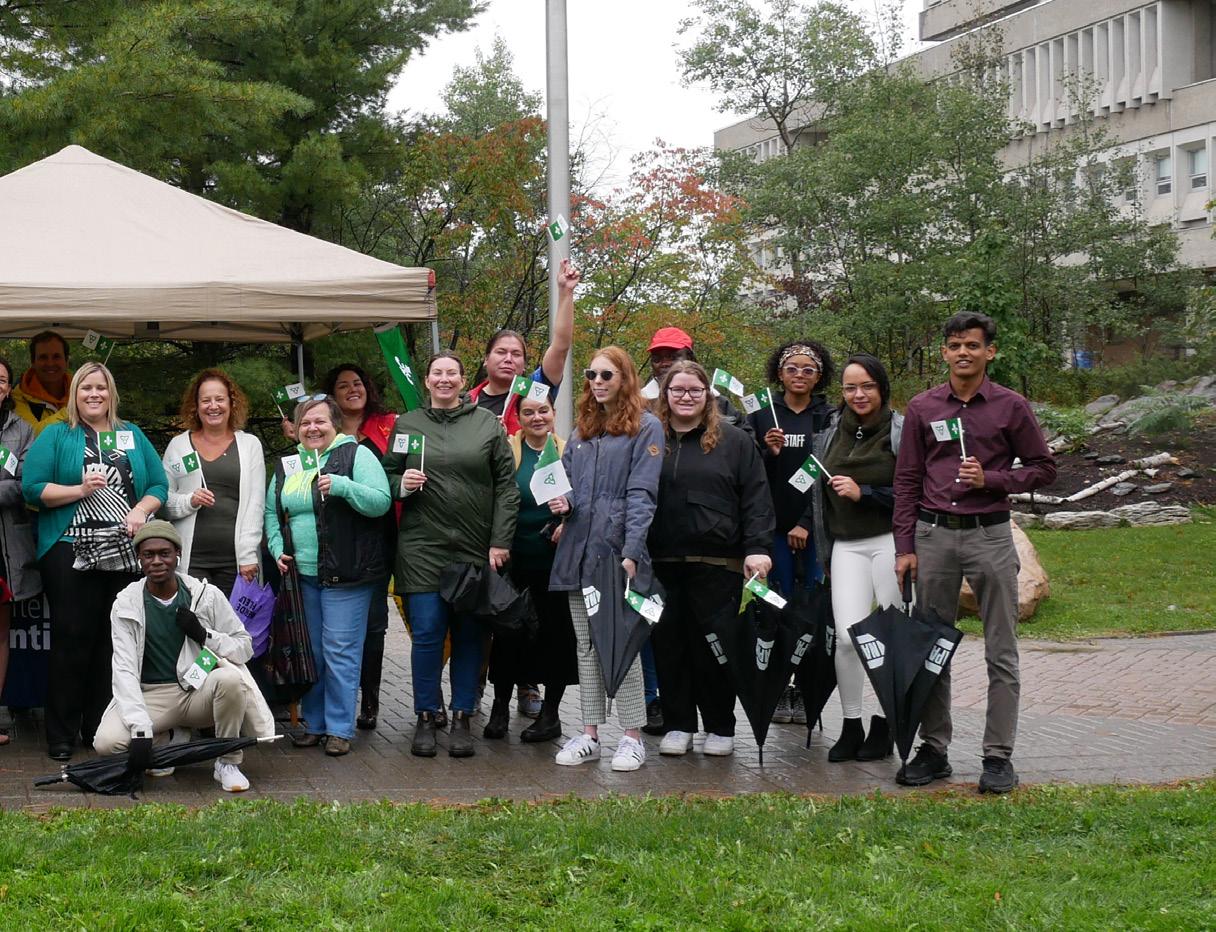
Higher Education Digest September 2023
At Laurentian University, there is a strong focus on recruiting international students for both on-campus and online studies
programs offered by Laurentian Online have received official approval from the Senate of Laurentian University.
Supporting Diverse Students
“At Laurentian University, we take pride in our diverse student population, which encompasses individuals of all ages, educational backgrounds, and geographical locations,” emphasizes Dr. Brockerhoff-Macdonald. Whether students are recent high school graduates, university graduates, or retirees, we are committed to ensuring their success. To support online learners, we provide comprehensive student support services that mirror the assistance and resources available to on-campus students.
Laurentian Online actively collaborates with industry stakeholders and employers to

44
develop credit micro-credential offerings. These partnerships are vital in shaping the curriculum and identifying the essential skills required for effective workforce participation. Dr. Brockerhoff-Macdonald elaborates, “Through close collaboration with our industry partners, we determine the curriculum content and pinpoint the specific skills learners need to thrive in the workplace. This collaborative approach allows us to design micro-credentials that are practical, relevant, and directly applicable to real-world employment opportunities.”
By staying connected to industry trends and requirements, Laurentian Online ensures the delivery of high-quality, job-ready education.
Laurentian University is dedicated to ensuring that online students have access to financial support. Online learners are eligible to apply for scholarships that are both generous and renewable, contingent upon maintaining the required academic average. Dr. BrockerhoffMacdonald highlights the significance of these scholarships in attracting high-achieving international students to Laurentian University. The availability of financial support creates opportunities for talented individuals from around the world to pursue their education with us.
The success of Laurentian Online’s alumni is a testament to the program’s impact. Graduates have pursued diverse educational paths, including medical school, law school, teacher’s college, and

Higher Education Digest September 2023
By adopting appropriate educational technologies supported by robust IT infrastructure, universities such as Laurentian can significantly enhance the quality and accessibility of online education

Higher Education Digest September 2023
Master’s degree programs. This demonstrates the wide range of opportunities available to them. Dr. Brockerhoff-Macdonald shares a notable achievement where an Indigenous Social Work student completed her degree parttime while raising three children in her home community. Throughout her educational journey, she developed strong connections with faculty members, exemplifying the supportive and engaging environment at Laurentian University.

Meeting Learning Needs with University Support
Dr. Brockerhoff-Macdonald highlights the importance of selecting appropriate educational technologies for online education that align with the learning and teaching needs of academic programs. She emphasizes the need for universities to ensure that the chosen technologies receive adequate support from their IT departments. At Laurentian University,
47 Higher Education Digest September 2023
there is a strong focus on recruiting international students for both on-campus and online studies. While opportunities for online studies exist, the university still encourages a preference for face-to-face, on-campus learning experiences whenever possible.
The ideal educational technology solution, according to Dr. Brockerhoff-Macdonald, should be scalable, adaptable, and customizable to meet the specific needs of faculty and students. Accessibility is a key consideration to ensure inclusivity for all learners. Dr. BrockerhoffMacdonald acknowledges the varying availability of educational technologies across countries and emphasizes the importance of considering cost implications for students. She also recognizes that access to reliable internet is not universally guaranteed as a fundamental human right, making offline functionality a crucial aspect of ensuring uninterrupted learning experiences.
By adopting appropriate educational technologies supported by robust IT infrastructure, universities such as Laurentian can significantly

enhance the quality and accessibility of online education. This advancement empowers both faculty and students to excel in a digital learning environment while promoting global engagement and the pursuit of knowledge. Dr. BrockerhoffMacdonald emphasizes the close collaboration with academic units at Laurentian University and excitingly announces the expansion of program offerings by Laurentian Online. This expansion includes the introduction of BA4 options, providing students with a broader selection of courses. Furthermore, Laurentian Online is actively working towards incorporating more graduate-level courses and programs into its offerings.
Laurentian Online’s commitment to accessible education has positively impacted numerous individuals, enabling them to realize their aspirations and unlock new possibilities. Looking ahead, the program remains dedicated to empowering learners, embracing change, and shaping the future of online education for generations to come.
48 Higher Education Digest September 2023

Leveraging Artificial Intelligence (AI) in Post-Secondary Career Advising
Pranay Reddy, MEd Candidate at Ontario Institute for Studies in Education at the University of Toronto
Pranay Reddy is a multilingual higher education professional with a decade of experience managing academic programs at prestigious institutions, including Ashoka University, the Indian Institute of Technology Gandhinagar, the University of Chicago, and the University of Toronto. Before his work in higher education, Pranay served as a pilot in the Indian Air Force after graduating from the National Defence Academy. Currently, Pranay is pursuing a Master of Education degree in Higher Education at the Ontario Institute for Studies in Education at the University of Toronto. He holds a master’s degree in psychology, a Post Graduate Diploma in Liberal Arts, and a Bachelor’s degree in Computer Science. Additionally, he is a certified life coach (ICF) with a passion for student leadership development, career transitions, and career advancement.
Abstract
The advent of Web 3.0 has ushered in a slew of changes in the field of career advising within the post-secondary education systems. This growth has catapulted in the last decade due to advancements in Artificial Intelligence (AI). Post-secondary education institutes, globally,
are now leveraging AI technologies to provide better career guidance and counseling to their graduating students. In this article, we will unpack the nuances of AI in University and College career advising, highlighting its benefits, challenges, and limitations. We will also examine the various ethical considerations
50 Higher Education Digest September 2023 ACADEMIC VIEW
Despite its merits, the use of AI in post-secondary career advising is also posed with potent challenges and limitations

51 Higher Education Digest September 2023
of deploying AI in career advising and recommend pathways to ensure its ethical use.
Introduction
Career advising in the realm of post-secondary has been considered a critical part of postsecondary education. Career educators or advisors help students and recent graduates to make informed decisions about their academic and career paths. Conventionally, career advising has remained a manual process, where students would meet with human career counselors or educators to brainstorm their interests, skills, and aspirations. However, with the advancements in AI, post-secondary institutions have now started leveraging AI technologies to provide better career guidance and counseling to their students.
Benefits of AI in Post-Secondary Career Advising
Post-secondary career advising can benefit from the use of AI on three levels:
Firstly, AI can generate personalized recommendations for all students based on their unique interests, skills, and career objectives. This has been made possible through the integration of predictive analytics and machine learning algorithms, which are capable of evaluating large sets of data and providing insights based on trends they identify.
Second, AI can assist students to uncover various career paths as possible options that they may not have considered otherwise. This is made possible through the use of natural language processing (NLP) and AI-enabled chatbots, which can engage students in conversational exchanges and yield information on various career options available to them.
52 Higher Education Digest September 2023
The integration of AI in postsecondary career advising has unlimited potential to revolutionize the field with numerous advantages
Lastly, AI can support career educators to organize their workloads more efficiently. This is made possible through the use of AIpowered digital tools such as scheduling assistants, which can help educators to schedule appointments and meetings with students.
Challenges and Limitations of AI in Post-Secondary Career Advising
Despite its merits, the use of AI in postsecondary career advising is also posed with potent challenges and limitations. One of the significant challenges is the lack of credibility in AI-generated insights among students and career advisors. This is due to the pervasive perception regarding AI that it lacks empathy and the propensity to understand human emotions.
Another major challenge is the apparent lack of transparency in the AI decision-making process. Most of the AI algorithms that are used are opaque in their execution, making it extremely difficult to understand how they arrive at their recommendations. This can propagate issues of bias and discrimination, especially if the data used to train the algorithms is considered biased. Finally, AI is limited due to the quality and availability of data. If the data that is used to train the algorithms is incomplete or outdated, the recommendations shared may not be accurate or coherent. For example, the star AI platform ChatGPT has limited knowledge of events that occurred after September 2021.
Ethical Considerations of Using AI in Post-Secondary Career Advising
The use of AI in post-secondary career advising raises several ethical considerations. First, there
is a problem with data privacy and security across AI platforms. The post-secondary institutions need to ensure that the data collected and used by AI technologies are safeguarded and shielded from any unauthorized access or misuse.
Second, there are issues with respect to algorithmic biases and implicit discrimination. Institutions must need to ensure that the AI algorithms used in their career advising repertoire are fair and reasonably unbiased and that they do not perpetuate existing socioeconomic or cultural biases.
Third, there is the issue of transparency and accountability of AI-powered tools. Institutions must ensure that the recommendations made by AI technologies during a career advising appointment are legit and credible to the students and educators.
Conclusion
In conclusion, the integration of AI in postsecondary career advising has unlimited potential to revolutionize the field with numerous advantages. It can easily achieve the humanly impossible feat by providing personalized and tailored advice to each student based on their individual interests, skills, and career objectives. Having said that, it also poses several challenges and limitations, including the general mistrust of AI, the lack of transparency in its decisionmaking methodology, and the limitations of its data availability and source. To ensure its ethical use, post-secondary institutions must address these challenges before considering AI in career advising.
53 Higher Education Digest September 2023
MILES COLLEGE

Offering FutureFocused Education
Transcending the Boundaries
Amidst the COVID-19 pandemic, online education has gained even more significance as a means for students to continue their academic pursuits while facing the challenges of the current environment. In recent years, numerous students have resorted to online programs as a secure and convenient way to continue their education. According to Dr. Steven E. Hairston, CFRM, Vice-President of Institutional Advancement and Title III Administrator at Miles College, “The pandemic compelled educational institutions to harness technology to develop virtual classrooms, enabling uninterrupted learning. This posed a particular challenge for historically disadvantaged students.”
54 Higher Education Digest September 2023
Miles College is a senior, private, liberal arts
Historically Black College with roots in the Christian Methodist Episcopal Church. The College through dedicated faculty cultivates students to seek knowledge that leads to intellectual and civic empowerment

Higher Education Digest September 2023
Miles College, situated in Fairfield, Alabama, presents a diverse range of online programs to students seeking a flexible and convenient mode of higher education. During the pandemic, Miles College devised innovative strategies to aid students lacking internet access, computers, and smartphones. The college provided comprehensive training to all faculty members and students to effectively teach and learn in a virtual environment within two weeks. Dr. Hairston asserts, “We maintain the quality of our online courses and programs by engaging in ongoing faculty development, conducting program and course evaluations and revisions, incorporating feedback from


Higher Education Digest September 2023
Bobbie Knight, President
corporate and industry partners, students, and obtaining accreditations.”
Miles College Online Education commenced its online course offerings in 2017. In December 2019, the college submitted an application to the Southern Association of Colleges and Schools Commission on Colleges (SACSCOC), which accredits higher education institutions granting degrees in the Southern states, to provide complete degree programs solely online. As a result, in the Fall of 2020, Miles College launched 100% online programs, enabling students to enroll and complete their degrees without setting foot on campus. Today, Miles College’s online programs serve as a valuable platform for students to achieve

their academic aspirations and adapt to the everevolving higher education landscape.
Presently, Miles College provides seven online programs, comprising Accounting, Business Administration, Computer and Information Sciences, Criminal Justice, Management, Management Information Systems, and Psychology. The college is developing and offering additional certificate and degree programs, which will be accessible shortly. Dr. Hairston notes, “Our students appreciate the individual attention they receive from our faculty members, who know them personally due to our small class sizes. Extending this personalized approach to our
Higher Education Digest September 2023
Dr. Steven E. Hairston serves as the Vice President of Institutional Advancement and Development at Miles College. In this role, he administers the Office of Advancement and Development, which on behalf of Miles College and the President, seeks to secure, and steward financial resources to support the college’s mission and strategic plan. His areas of responsibility include Individual, Corporate, and Foundation Relations, Sponsored Programs, Public Relations, and Alumni Affairs. He will also serve as the college’s Title III Administrator, CorporateSecretary,andTreasurerfortheMilesCollegeCommunityDevelopmentCorporation. Dr. Hairston also serves as the Director of the Miles College UNCF Transformation Initiative Project and Program Advisor to the Miles College-Strada Education Network Scholar Program.

58 Higher Education Digest September 2023
Dr. Steven E. Hairston, CFRM Vice-President of Institutional Advancement and Title III Administrator
ABOUT
online programs makes Miles College stand out in the online education arena.”
A Perfect Support System
As a significant proportion of Miles College’s online students are working adults juggling familial commitments, the college takes measures
to assist them by meticulously selecting and training faculty members who empathize with the challenges and requirements of this demographic.
Dr. Hairston emphasizes, “We are committed to providing all our online students with the necessary support and resources to ensure their success. Our faculty members and advisors
Miles College is an institution of academic excellence whose students, graduates, and faculty contribute to the intellectual and professional vitality of the broader community, exhibit technological sophistication, and value the renderings of art in all its forms
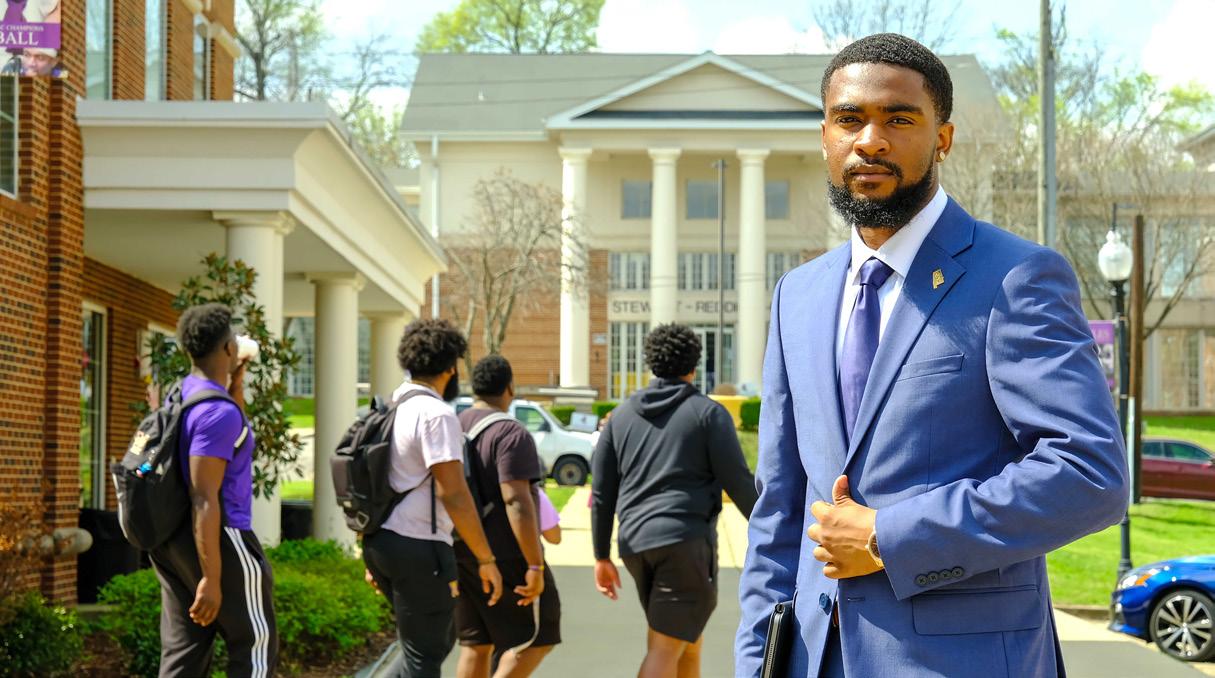
Higher Education Digest September 2023
possess extensive experience in facilitating the achievement of online students through ongoing outreach and engagement.”
Miles College Online Education has exceeded all initial projections, with nearly fifty percent of its students either exclusively enrolled online or taking at least one online course. Dr. Hairston affirms that the college prioritizes enhancing the interactivity and engagement of online classes by presenting top-notch content, utilizing appropriate
technology, addressing students’ needs, setting objectives, injecting fun into learning, and dividing the lessons into easily digestible modules. Miles College facilitates an avenue for industry partners and employers to contribute to students’ workforce readiness by inviting them to speak at college events or serve as guest lecturers in the classrooms. Furthermore, students gain practical experience through internships, practicums, and summer jobs with industry partners and employers.

Higher Education Digest September 2023
Miles College has 135 faculty members who are visibly committed to higher learning and professional development. Faculty members are diverse and bring professional and personal experiences from over twenty countries
At Miles College, online students have an equal chance to qualify for scholarships available to on-campus students, except for scholarships linked to activities requiring physical attendance, such as Band, Football, and Basketball. Additionally, Miles College strives to improve the quality of education through partnerships with other colleges and universities worldwide. One such example is the college’s partnership with Ravenshaw University in India. Dr. Hairston and his team expect that Miles College’s historical involvement in the Civil Rights Movement positions the college as a prominent global institution for teaching and learning.

61 Higher Education Digest September 2023
Transforming Lives Through the Student Experience
Dr. Art R. Malloy is the vice president for student affairs at the University of North Dakota. He previously served as the interim vice chancellor for student affairs and dean of students at the University of North Carolina at Pembroke. With nearly 30 years of higher education experience, Dr. Malloy is a student affairs and student success practitioner focused on building programs that promote leadership development and student success. He has held leadership positions at the Savannah College of Art and Design in Atlanta, Georgia, where he served as dean of student success, and at Winston-Salem State University, where he served as associate vice chancellor for student affairs and dean of students. He has also held leadership roles at Winston-Salem State University, Indiana University of Pennsylvania, Wittenberg University, Ohio State University, and North Carolina State University.
Colleges and university administrators spend billions of dollars to attract the best and brightest students. They leave no stone unturned. But what happens to these students after they enroll? The commitment in higher education to attract and enroll students is unquestionable, but
student persistence is often where problems arise. Enrolling is not educating; nor does it guarantee that students will be retained. Contemporary views of higher education equate the cost of funding the college or university experience to an investment in a student’s future with hopes of a strong return on investment. Numerous reports
62 Higher Education Digest September 2023 ACADEMIC VIEW
Dr. Art R. Malloy, Vice President - Student Affairs, University of North Dakota
After spending billions to recruit students, create first-year programs and mentoring opportunities, and implement an array of high-impact practices, higher education administrators continue to fail students

63 Higher Education Digest September 2023
by leading higher education consultants indicate parents and students have high expectations related to their investment in higher education and expect the end result to be a student educated sufficiently to be able to seamlessly enter the world of work immediately after graduation.
There are four questions that parents and students need to be prepared to ask prior to enrolling at any institution of higher education to ensure students will have access to a transformational educational experience. Parents should ask these questions to administrators at every college or university being considered and pay close attention to the answers.
1. Does the institution have a discernable plan for student success?
2. Are their adequate resources dedicated to the out-of-class student experience?
3. Is there a plan for experiential learning that provides preparation for the world of work?
4. Is the alumni base actively engaged in the lives of current students?
After spending billions to recruit students, create first-year programs and mentoring opportunities, and implement an array of highimpact practices, higher education administrators continue to fail students. Too many services, activities, and programs are offered without meaningful collaboration across the university. This results in duplication of effort and confusion for students about what is important. As a result, students are often engaged in disjointed and purely transactional experiences that may or may not serve their needs. What is needed is a collaborative institutional approach that defines and creates an outstanding student experience inside and outside
64 Higher Education Digest September 2023
It is essential for colleges and universities to provide a platform for alumni to stand in front of new students and proclaim that their student experience contributed to their student success and can do the same for them
of the classroom that offers the student a pathway to student success from orientation to graduation.
Transactional experiences may work for students who arrive on campus with sufficient social capital to navigate the college experience. Others may need a guided process that provides a structured approach to navigating the complexities associated with the college experience and high it might be ordered or sequenced to maximize student success. Such a process must be assessed with instrumentation constructed by all key stakeholders. If student success is the goal, higher education administrators must start with that goal in mind. Hoping that students will navigate the college experience by taking advantage of the opportunities offered is simply not a strategy. Such hoping will only serve to increase the likelihood that students will find themselves well off-course in regard to student success; change majors multiple times or stop out or drop out due to lack of individual attention to their needs. Guided pathways to student success in which faculty and administrators collaborate to create a plan for success tailored to the needs of each student is essential. Parents and students expect colleges and universities to have a plan in place to help students succeed and allow them to seamlessly exit upon graduation and gain employment in their chosen fields of study.
A Discernable Plan for student success
Transformative experiences begins with a commitment to the students in year one to connect them with resources related to mentoring, tutoring, comprehension of their financial obligations to the university, and an introduction to a plan that puts them on a path to academic discovery, experiential learning that facilitates
work or research experience and opportunities to gain leadership experience, engage in discourse that allows for greater cultural understanding and respect, and participate in service-related opportunities. All these endeavors must be done in the sequence deemed appropriate by those who develop the student experience at each higher education institution.
Resources dedicated to the out-of-class experience
There are few, if any worries about the in-class experience given that so many colleges and universities have world-class faculty. Students and parents expect there to be adequate resources to facilitate the out-of-class student experience. They should explore and determine if there are resources for study abroad trips and funds earmarked for undergraduate research, internships and apprenticeships, and funding for cultural events and speakers’ series that expose students to the best and brightest. Every administrator must know about these resources, have a means to access them, and be willing to share them with students as they encourage them to fully utilize them.
Colleges and universities, like the world’s top corporations, must be concerned with the student experience and the impression that is left after accessing the services, programs, and opportunities provided. Each program, activity, and service must be associated with a goal designed to promote learning outcomes shared throughout the higher education institution. Shared learning outcomes related to the student experience make it easier to unify messaging. It will make it easier for academic advisers, financial advisers, and career advisers to partner with faculty to create a
65 Higher Education Digest September 2023
plan for student success tailored to the needs of each individual student.
Preparation for professional careers
Some academic programs require students to participate in activities and programs that prepare them for professional careers. While internships, clinical rotations, undergraduate research, volunteering, and on and off-campus jobs provide much-needed opportunities for students to gain work experience, academic partnerships that allow the student to collaborate within the classroom setting to solve real-world problems also contribute to career preparation.
Excellence in the classroom without any experience in a student’s chosen major can prove to be disastrous when they enter the job market. Since colleges and universities are aware of this, it is incumbent upon them to create and build within any plan for student success, appropriate opportunities for students to gain experience on campus, in local communities, or through study away or study abroad programs. If the end goal is for students to be employed, career preparation must be a priority throughout the academic life of all students and not just some of them.
Active and engaged alumni
Some colleges and universities utilize alumni in new student orientation for first-year students
and in graduate orientation to help students develop or expand their professional networks. Additionally, for new graduate or undergraduate students, it can be highly inspirational to see a recent graduate who is employed and giving back to their alma mater. It is essential for colleges and universities to provide a platform for alumni to stand in front of new students and proclaim that their student experience contributed to their student success and can do the same for them.
It is also important for students to see what it means to be an active member of the alumni. It is equally important for students to hear that alumni will be a resource for them as a mentor, coach, or simply another person who encourages and inspires them to complete their degree and join them in the workforce.
Conclusion
Each student must be made aware of the tailored experience designed to promote pathways to student success. Annual assessment of institutional efforts to create and implement a common student experience will be essential for the purposes of sharing findings with students, faculty, staff, and alumni to continuously improve the experience. Such an endeavor will provide a transformational experience for all students, provide an educated workforce, and help to create a strengthened and informed alumni base.
66 Higher Education Digest September 2023
Transactional experiences may work for students who arrive on campus with sufficient social capital to navigate the college experience

UNICAF UNIVERSITY

Igniting Education Beyond Boundaries and Cultivating Tomorrow ' s Trailblazers
The imperative for higher education within Africa assumes both urgency and magnitude. Despite its population exceeding one billion, the continent grapples with one of the planet’s lowest rates of higher education participation. This concern is accentuated by Africa’s demographic makeup, characterised by its youthful populace, with a median age hovering around 19 years. This demographic potential stands as an untapped resource, with higher education emerging as the pivotal force behind its actualisation.
The impact of higher education extends beyond individual growth, encompassing societal, economic, and political development. It nurtures
68 Higher Education Digest September 2023
Unicaf presents itself as a dynamic and ambitious online higher education platform with a primary focus on redressing the stark dearth of quality higher education within Africa

Higher Education Digest September 2023
Dr Nicos Nicolaou is the Founder and CEO of Unicaf, the leading online higher education platform in sub-Saharan Africa offering internationally recognised Bachelor’s, Master’s and Doctoral degree programmes. Dr Nicos has been involved in higher education for the last 25 years and was involved with the establishment and successful operation of a number of educational institutions.
He founded UNICAF in 2012 which in a very short time became the most successful online higher education platform and in 2016 he founded Unicaf University which has degree awarding powers in sub-Saharan Africa. Unicaf provides UK partner institutions with a comprehensive operating infrastructure needed to attract, enrol, educate, support and graduate students globally. He is committed to ensure that access to quality higher education is not limited by geographical location, tuition fees, or lack of access to academic resources.
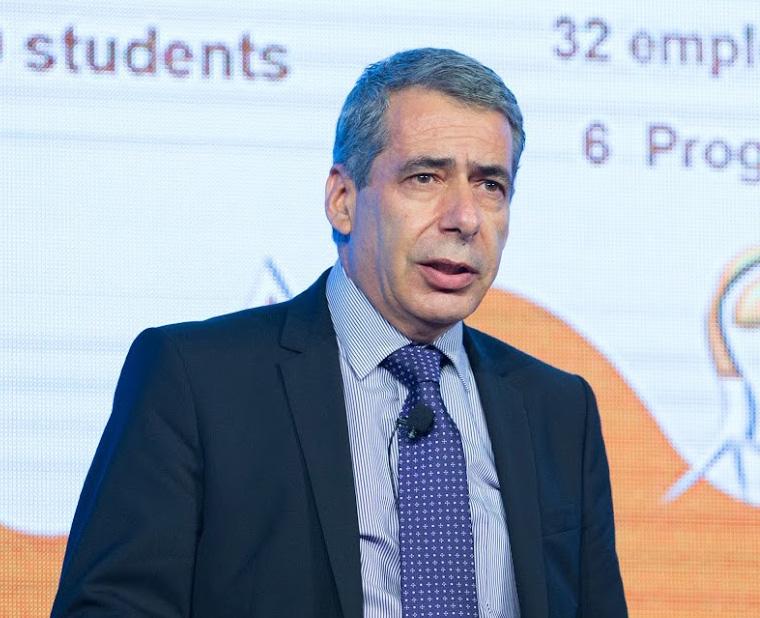
70 Higher Education Digest September 2023
Dr Nicos Nicolaou Founder and CEO, Unicaf
ABOUT
critical thinking, incubates innovation, and equips individuals with the proficiencies required to lead and navigate a knowledgedriven economy. However, conventional models of higher education want to address the escalating demand for quality education in Africa, both in scale and relevance.
In this context, the emergence of Unicaf University assumes prominence. Unicaf presents itself as a dynamic and ambitious online higher education platform with a primary focus on redressing the stark dearth of quality higher education within Africa. The fundamental tenet of Unicaf resides in the belief that education serves as a cornerstone for societal development and progress. This conviction gains heightened relevance within the African continent, which boasts a vibrant, youthful demographic primed to reap substantial benefits from an influx of welleducated professionals.

71 Higher Education Digest September 2023
In a strategic alliance with prominent institutions of learning on the global stage, Unicaf University forges collaborative relationships with distinguished universities in the United Kingdom and the United States
At the core of Unicaf’s vision lies the recognition of digital technology’s transformative potential in democratising access to quality higher education. Through the online platform, Unicaf extends the reach of exceptional higher education to gifted individuals across Africa. These opportunities, which financial constraints, geographical isolation, or personal circumstances would otherwise render inaccessible, now become attainable. The commitment remains steadfast, focused on rendering top-tier, applicable, and adaptable higher education a tangible reality for numerous eligible African students.
Unicaf’s mission transcends the mere dispensation of academic credentials. Its scope encompasses a broader socioeconomic revolution across the African continent. The institution ardently dedicates itself to equipping students with the proficiencies, knowledge, and aptitudes required to catalyse economic growth and effect positive change within their communities. The ultimate objective is to cultivate a novel cohort of leaders, trailblazers, entrepreneurs, and professionals who will spearhead Africa’s impending era of advancement and prosperity.

72 Higher Education Digest September 2023
Leveraging an innovative online platform, Unicaf provides courses with unparalleled flexibility, catering to the diverse needs of its student body

Empowering through Global Partnerships
In a strategic alliance with prominent institutions of learning on the global stage, Unicaf forges collaborative relationships with distinguished universities in the United Kingdom and the United States. This alliance serves as the conduit through which Unicaf extends universally recognised degree programmes and professional development courses to African scholars via an inventive online platform. Leaning on the capabilities of digital technology, we systematically dismantle the conventional constraints of geographical and financial hindrances often associated with accessing higher education.
The nexus between Unicaf and UK universities stands as a pivotal facet of our operational model. Presently, our esteemed UK partners include the University of East London, Liverpool John Moores University, and the University of Suffolk. These alliances empower us to proffer our students with internationally acclaimed degree programmes distinguished by exceptional quality and relevance, all at a fractional cost.
Central to these collaborations is the unique opportunity afforded to our students— earning an internationally recognised degree without the necessity of relocating from their home country. In a conventional paradigm, pursuing studies abroad, notably in the UK, would entail substantial costs and upheavals in personal and professional routines. However, by enrolling with Unicaf, African scholars can secure the same esteemed degree at a significantly reduced expenditure, all while remaining within the comfort of their homelands.
73 Higher Education Digest September 2023
Yet, the array of advantages we extend stretches far beyond mere cost-effectiveness and convenience. Our students are immersed in curricula meticulously curated by domain experts at these venerable UK institutions. Their assessments are held to the same exacting standards as their peers studying within the UK’s campus walls. Unicaf scholars graduate equipped with a repository of competencies and insights that hold global relevance, thereby positioning them with a distinct competitive edge in the worldwide job market. This synthesis of knowledge and
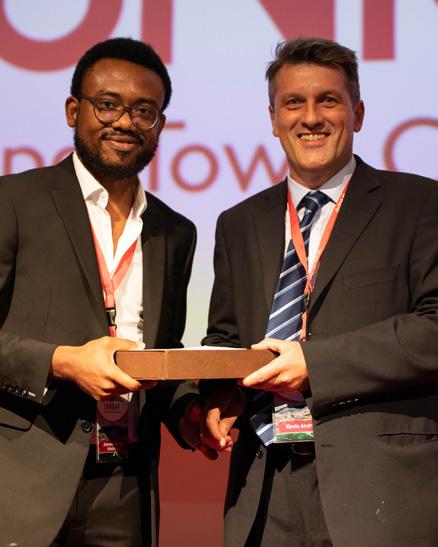

74 Higher Education Digest September 2023
opportunity underscores Unicaf’s commitment to enhancing the prospects and capabilities of its students, reinforcing the institution’s status as a beacon of scholarly excellence.
Enriching Education through Blended Learning
Employing a blended learning approach, Unicaf University bridges the gap between traditional and online education methodologies. Leveraging an innovative online platform, Unicaf provides courses with unparalleled flexibility, catering to the diverse needs of its student body. This approach is particularly beneficial for individuals managing work commitments and family responsibilities alongside their studies.
Unicaf’s educational paradigm combines the strengths of digital and in-person learning. While the primary mode of instruction is online, the institution acknowledges the value of face-toface interactions. This recognition has led to the establishment of physical campuses in Malawi, Zambia, and Uganda. These campuses offer a
blend of online and classroom-based learning, ensuring that students receive a comprehensive educational experience.
The physical campuses, staffed by experienced educators and equipped with cutting-edge facilities, serve as vibrant hubs for intellectual exchange. They foster an environment where students can collaborate, engage in academic discussions, and cultivate connections that extend beyond graduation. Additionally, these campuses facilitate the delivery of programmes with practical or laboratory components, demonstrating Unicaf’s commitment to versatile and innovative education.
A significant milestone in Unicaf’s journey is the upcoming completion of a state-ofthe-art campus in Zambia. This development underscores the institution’s dedication to expanding its educational reach and enhancing its infrastructure to cater to the growing demand for quality higher education in the region. The new Zambian campus, situated in a dynamic and contemporary setting, embodies academic
75 Higher Education Digest September 2023
Unicaf
University is accredited by the British Accreditation Council in the UK and is recognized by relevant authorities in the countries where it operates
excellence. Equipped with cutting-edge technology, modern classrooms, and robust digital infrastructure, this campus is designed to foster an environment conducive to innovative learning and teaching.
More than just a physical structure, the new Zambian campus signifies a thriving academic community—a space where students, faculty, and staff converge to engage in transformative education, advance the boundaries of knowledge, and contribute to socio-economic development within Zambia and beyond. This campus exemplifies Unicaf’s commitment to offering education that is globally recognised and locally relevant, creating opportunities for personal growth and societal progress.
Accreditation and Scholarships: A Commitment to Excellence
Unicaf University holds steadfast in its belief that quality assurance is paramount to delivering exceptional education. In pursuit of this ethos, the institution meticulously follows rigorous processes to ensure that its courses meet the highest academic benchmarks. Accreditation by esteemed bodies underscores

76 Higher Education Digest September 2023
Over the years, Unicaf has been instrumental in providing scholarships valued at over $100 million, unlocking doors to education for countless students who might have otherwise been denied the opportunity
the institution’s dedication to excellence.
Notably, Unicaf University is accredited by the British Accreditation Council in the UK and is recognised by relevant authorities in the countries where it operates. Equally significant, the partner universities boast recognition from pertinent UK regulatory bodies.
For students, this accreditation translates to a resounding affirmation that their degrees will command respect and recognition, no
matter where their professional journey leads. The assurance extends beyond the classroom, validating that the education imparted is not only rigorous and current but also endorsed by some of the world’s most esteemed quality assurance bodies.
Yet, this commitment to quality transcends the realm of accreditation. Unicaf University remains unwavering in its mission to uphold the relevancy of its curricula within the swiftly changing global

77 Higher Education Digest September 2023
Unicaf University’s core belief is that education transcends a one-size-fits-all model, embracing instead a nuanced, localized approach that embraces the distinct socio-economic landscapes of diverse locales

landscape. The institution invests in continuous review and updates to ensure its academic offerings remain aligned with contemporary demands. The commitment to quality is further exemplified by the institution’s investment in training its academic staff, equipping them to deliver a world-class education.
However, Unicaf University’s dedication to education accessibility doesn’t stop at quality assurance. The institution firmly believes that financial constraints should never stand as an impediment to accessing quality higher education. To this end, Unicaf has forged a robust scholarship programme, a cornerstone of its commitment to affordability.
The Unicaf Scholarship Programme is conceived to alleviate the financial burden often associated with internationally recognised academic degrees. These scholarships, accessible to deserving students, are granted based on various criteria, encompassing academic merit and financial need. Collaborating closely with partners, donors, and stakeholders, Unicaf ensures the availability of these scholarships. They signify a substantial investment in the future of students and by extension, the trajectory of the African continent.
78 Higher Education Digest September 2023
Over the years, Unicaf has been instrumental in providing scholarships valued at over $100 million, unlocking doors to education for countless students who might have otherwise been denied the opportunity. This endeavour is perceived as an investment in Africa’s human capital, a cornerstone of Unicaf’s overarching mission to steer socio-economic development across the continent. This holistic commitment to quality, accessibility, and
progress distinguishes Unicaf as a beacon of educational advancement.
Pioneering a Vision for the Future
Unicaf University’s trajectory is one of expansion and growth, illuminating a path toward a future ripe with possibilities. As the institution hones its online platform and broadens its programme portfolio, it simultaneously sets its sights on new horizons by venturing into unexplored territories. This strategic blueprint includes plans to establish a presence in five additional African countries in the imminent future.
Beyond numerical expansion, this journey signifies Unicaf’s commitment to crafting tailored educational experiences that resonate with the unique needs and potential of each region. The institution’s core belief is that education transcends a one-size-fits-all model, embracing instead a nuanced, localised approach that embraces the distinct socio-economic landscapes of diverse locales.
In tandem with this geographical outreach, Unicaf’s dedication to enriching academic offerings remains steadfast. The aspiration extends to delivering programmes that not only exemplify academic rigour and international recognition but also align seamlessly with the evolving demands of the professional sphere.
Simultaneously, the institution dedicates resources to research initiatives, particularly in domains pivotal to Africa’s developmental progress. A firm conviction guides Unicaf—a belief that as a higher education establishment, it bears a profound responsibility to contribute to the generation of knowledge and offer empirically grounded solutions to the continent’s pressing challenges.

79 Higher Education Digest September 2023
A firm conviction guides Unicaf—a belief that as a higher education establishment, it bears a profound responsibility to contribute to the generation of knowledge and offer empirically grounded solutions to the continent’s pressing challenges
This era of expansion ushers in a captivating chapter in Unicaf’s narrative. With zeal, the institution anticipates propagating quality, accessible, and adaptive higher education to an even broader spectrum of students across the continent. This commitment to upholding quality, nurturing innovation, and cultivating student triumph remains unswerving. The forthcoming impact of these initiatives is poised to transform individual trajectories, community dynamics, and the overarching tapestry of African society. As Unicaf strides into this promising epoch, its dedication to pioneering positive transformation stands resolute—to be harbingers of constructive change and architects of comprehensive advancement.

80 Higher Education Digest September 2023
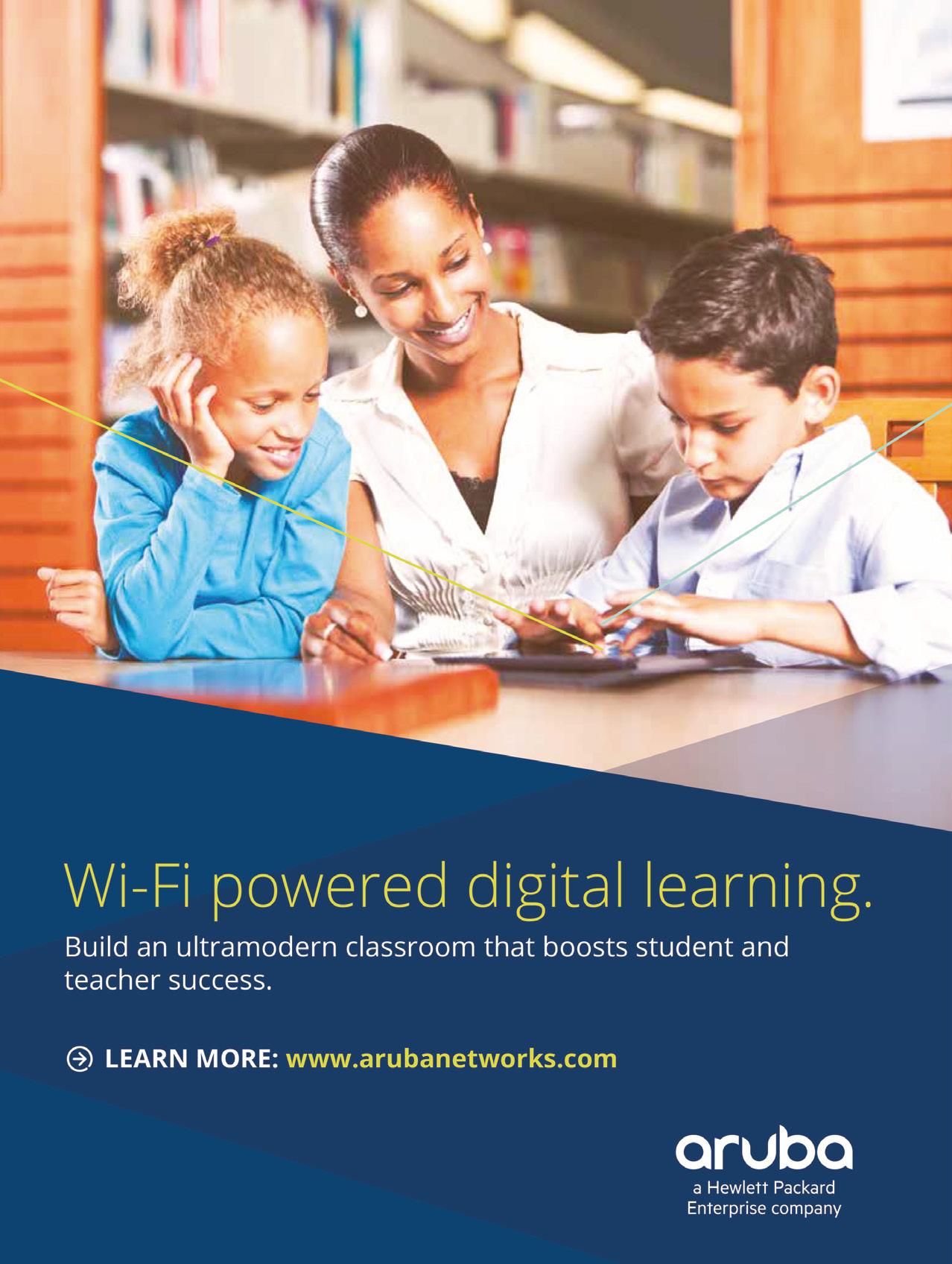
UNIVERSITY OF BIRMINGHAM
To Explore the World of Online Education with Flexibility, Quality, and Success
In an increasingly interconnected world, the University of Birmingham shines as a beacon of academic excellence, extending its reach beyond traditional boundaries to offer prestigious online programs. With a rich history and global recognition for high-quality teaching and research, the university provides flexible and accessible education for learners around the globe.
The online programs offered by the University of Birmingham cover a diverse array of fields, including business, bioinformatics, education, engineering, healthcare, public administration, energy, environmental law, and design for learning environments. Whatever their passion, students have the opportunity to unlock their potential and propel themselves toward success.

82 Higher Education Digest September 2023
University of Birmingham’s 100% online programmes have been purpose-built from the ground up to harness the full power of the technologies available, involving everything from cloud-powered collaboration to interactive live lectures

Higher Education Digest September 2023
Renowned as a research-intensive university, the University of Birmingham brings its legacy of academic excellence to its online programs. Students benefit from intellectually stimulating courses and receive a respected education that is highly valued by employers.
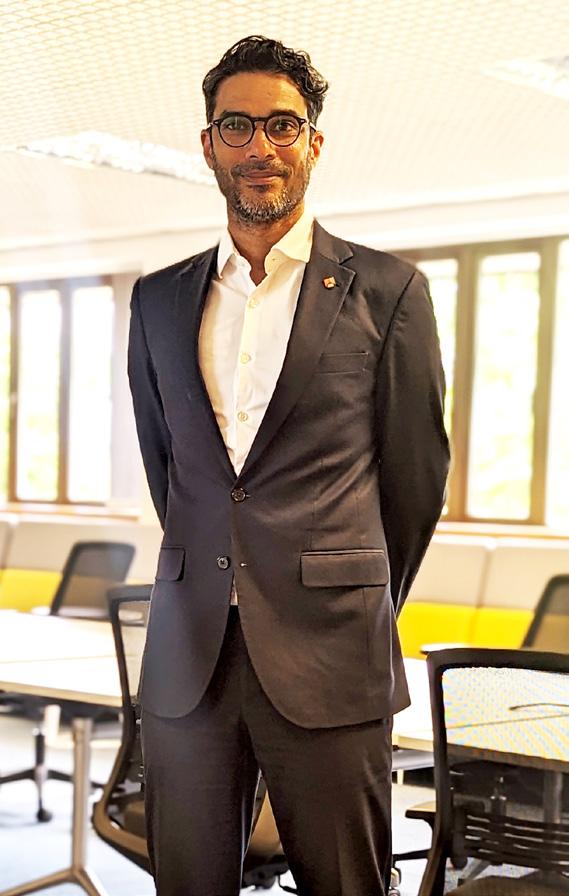
What sets the University of Birmingham’s online programs apart is their learner-centric design. Each program is meticulously crafted to offer a distinctive learning journey, leveraging cutting-edge technology and creating an engaging and interactive online environment. This ensures that students have a fulfilling educational experience and fosters collaboration among peers and faculty.

84 Higher Education Digest September 2023
Kabir Ganguly, Associate Director, University of Birmingham Online
Flexibility is key to success, and the University of Birmingham’s online programs understand that. Students can balance their education with their personal and professional lives, thanks to the freedom and accessibility of the online format. With 24/7 access to learning materials and the ability to participate from anywhere in the world, students can pursue their academic goals at their own pace.
By enrolling in the prestigious online programs offered by the University of Birmingham, students join a community of ambitious individuals dedicated to unlocking their full potential. They have the opportunity to embark on a transformative educational journey where knowledge knows no borders and possibilities are limitless.
Transforming Careers: Success Stories from the University of Birmingham’s Online Programs
To ensure the quality and effectiveness of its online education, the University of Birmingham implements various strategies, quality assurance processes, and cutting-edge technologies. The institution boasts a team of experienced academic staff who are experts in their respective fields and possess extensive teaching experience in both oncampus and online settings.
The online learning environment at the University of Birmingham incorporates innovative technologies, interactive learning materials, and multimedia resources, fostering student engagement and deepening understanding. By leveraging these tools, students benefit from a comprehensive educational experience that equips them with the knowledge and skills necessary to excel in their chosen fields.
The University of Birmingham maintains a commitment to relevance and currency

85 Higher Education Digest September 2023
The University of Birmingham is a long-established provider of distance learning postgraduate education, and also currently offers a choice of four 100% online programmes: a Masters of Public Administration, an AMBA-accredited MBA, an MSc International Management and an LLM in Energy and Environmental Law

by regularly reviewing and updating its online courses. This ensures that students receive an education that aligns with the latest research findings and industry practices. By staying current, the university equips students with the most up-to-date knowledge and prepares them to tackle real-world challenges with confidence.
Numerous success stories have emerged from students who have completed online programs at the University of Birmingham, underscoring the impact and quality of these programs. Graduates, particularly those who have completed the online MBA program, have experienced significant career advancements. They have reported securing promotions, salary increases, and new job opportunities across various sectors. The University of Birmingham’s online degrees have provided these graduates with the necessary knowledge, skills, and credentials to thrive in their chosen fields.
These success stories stand as a testament to the transformative power of a University of Birmingham online education. Graduates emerge with a competitive edge, armed with industry-relevant knowledge and practical skills that make a tangible impact in their professional lives. The reputation and rigor associated with the University of Birmingham name have opened doors and created opportunities for these graduates to excel in their careers.
86 Higher Education Digest September 2023
Supporting Online Success: Resources, Engagement, and Admission Requirements
Online students at the University of Birmingham receive comprehensive support and access to a wide range of resources to ensure their success throughout their academic journey. Dedicated online learning support teams are readily available to provide technical assistance and guidance, offering
students the necessary tools to navigate their programs effectively.
To facilitate research and study, the University of Birmingham provides online library resources, databases, and research materials that can be accessed remotely. Students have the opportunity to delve into an extensive collection of resources, enabling them to conduct thorough research and enhance their learning experience.

Higher Education Digest September 2023
A leading global university, University of Birmingham combines a strong reputation for teaching excellence and pioneering research with engaging online learning techniques
In order to foster a sense of community, online learners are encouraged to engage with their fellow students through online student communities. These platforms serve as valuable spaces for connecting with peers, participating in discussions, and collaborating on projects. By actively engaging in these communities, online
students can cultivate a sense of belonging and forge meaningful connections with the wider university community.
Interaction and engagement between online students and faculty members are of utmost importance. The University of Birmingham employs a variety of tools and platforms, such

Higher Education Digest September 2023
as virtual classrooms, discussion forums, and online communication tools, to facilitate realtime interactions and discussions. Faculty module leads are readily available to offer guidance and support through virtual office hours and email correspondence. Additionally, students are provided with opportunities for virtual collaboration through group projects and online group workspaces. These avenues of interaction ensure that online students receive personalized support and maintain an engaging and dynamic learning experience.
When considering admission to the University of Birmingham’s online programs, prospective students should note that admission requirements and prerequisites may vary depending on the specific program of interest. Generally, applicants are expected to meet certain academic qualifications and submit supporting documents, such as transcripts and letters of recommendation. The application process typically involves completing an online application form and submitting the necessary documents. Once the application is reviewed and accepted, students can enroll in the online program and commence their studies, embarking on a transformative educational journey.
By providing robust support systems, a wealth of resources, and avenues for engagement, the University of Birmingham ensures that online students have the tools and guidance needed to thrive in their academic pursuits. The institution’s commitment to online education creates an environment where students can excel, collaborate, and achieve their goals, no matter their location or schedule.
Strengthening Opportunities: Partnerships, Future Programs, and Expansion
The University of Birmingham recognizes the importance of partnerships and collaborations in enriching its online programs. Through strategic alliances with industry leaders, professional associations, and educational institutions, the university enhances the educational experience for its students. These collaborations provide students with additional resources, networking opportunities, and valuable industry insights.
By partnering with employers, the University of Birmingham creates avenues for internship opportunities and job placements for online learners. These connections bridge the gap between academia and the professional world, giving students practical experiences that complement their coursework and enhance their career prospects. The university’s collaborations empower students with valuable connections and real-world exposure, preparing them for success in their chosen fields.
Exciting developments are on the horizon at the University of Birmingham. The imminent launch of the MSc Mental Health and Engineering Leadership programs, as pathways from the MBA, highlights the university’s commitment to expanding and refining its online course offerings. Just like any top-ranked higher education provider, the University of Birmingham continually adapts its programs to meet the evolving needs of learners. As plans for future online programs take shape, the university remains dedicated to introducing new offerings in high-demand areas. These may include emerging fields, interdisciplinary studies, or specialized professional programs. By expanding its online
89 Higher Education Digest September 2023
program portfolio, the university ensures that students have a diverse range of options to choose from, allowing them to pursue their passions and career aspirations.

As the University of Birmingham continues to forge partnerships, develop innovative programs, and expand its online offerings, students can confidently embark on their educational journey. By choosing the University of Birmingham’s prestigious online programs, learners gain access to a wealth of resources, industry connections, and future-focused opportunities. Whether it’s exploring new fields or honing their expertise, students at the University of Birmingham find themselves at the forefront of academic excellence and career advancement.
The University of Birmingham stands out as an exceptional choice for online education. Renowned for its academic excellence and global recognition, the university offers highquality programs that are respected by employers worldwide. With flexible and accessible online learning options, students can study at their own pace from any location. The university’s commitment to innovation and advanced technologies enhances engagement and learning outcomes. Comprehensive support services and opportunities for interaction create a supportive and enriching online learning experience. Choosing the University of Birmingham ensures a top-tier education, empowering students to achieve their academic goals and advance their careers.
Higher Education Digest September 2023






Workplace Belonging in Higher Education
Dr. Terrell Strayhorn, Professor of Higher Education; Women’s & Gender & Sexuality Studies at Illinois State University
Dr. Terrell Strayhorn is a Professor and Director of the Center for the Study of Historically Black Colleges and Universities (HBCUs) at Virginia Union University (VUU). Author of 12 books and over 200 peer-reviewed journal articles, books, and reports, Strayhorn is one of the nation’s most prolific scholars with a leading voice on racial equity, human success, and a sense of belonging in education and employment. He is President/CEO of Do-Good Work Consulting Group, a Member of the Children’s Defense Fund’s (CDF) Freedom Schools Research Advisory Committee, and a Diversity Scholar-in-Residence at Harrisburg Area Community College. Professor Strayhorn serves on several non-profit boards including Minds Beyond Measure and MCT Educational Foundation.
Workplace belonging is an essential component in creating a positive and productive work environment, especially in the field of higher education where work life tends to be student-centered, team-oriented, and results-driven, requiring employees to work
long hours, wear multiple hats, and go above the call of duty. Workplace belonging refers to the feelings of connectedness and inclusivity that employees have towards their work, workplace, and colleagues. It is essential for college faculty and staff to feel a strong sense of belonging in order to build a positive work culture marked by
92 Higher Education Digest September 2023 ACADEMIC VIEW
Exceptional leaders have the ability to inspire others through their bravery, unwavering dedication to a purpose, and genuine connection with people

93 Higher Education Digest September 2023
deep employee engagement, shared governance, collegiality, and high morale.
Because it fosters an atmosphere that is supportive of teamwork, mutual sharing, and collaboration, workplace belonging is critical for faculty and staff in higher education institutions, regardless of campus location, size, or type. Know it or not, workplace belonging makes it possible for everyone to work together in a more collaborative, efficient, and productive manner, regardless of rank, tenure, title, or station within traditional campus hierarchies. It encourages employees to bring their own distinctive perspectives, unique experiences, cultural voices, and creative ideas to the table, so to speak. And that table is truly set (or reset) for them, not just those with the most money, power, titles, or direct reports.

94 Higher Education Digest September 2023
To facilitate workplace belonging in higher education, human resource talent management (HRTM) leaders can make concerted efforts to advocate for diversity in the workplace and ensure that hiring practices are inclusive
[Graph of relationship between workplace belonging and days off due to sick leave]
Higher education faculty and staff who feel like they belong and matter at work tend to have more positive outcomes in the long run. Research has shown that a strong sense of workplace belonging can have numerous positive gains for higher education personnel. It can lead to increased job satisfaction and work-related happiness, which can result in higher productivity and lower burnout. It can also foster deeper institutional commitment, leading to less turnover, more stability, and greater creativity and innovation. Specifically, I’ve found that workplace belonging is positively correlated with job satisfaction for part-time adjunct faculty at 2-year community colleges, year-to-year retention for administrative
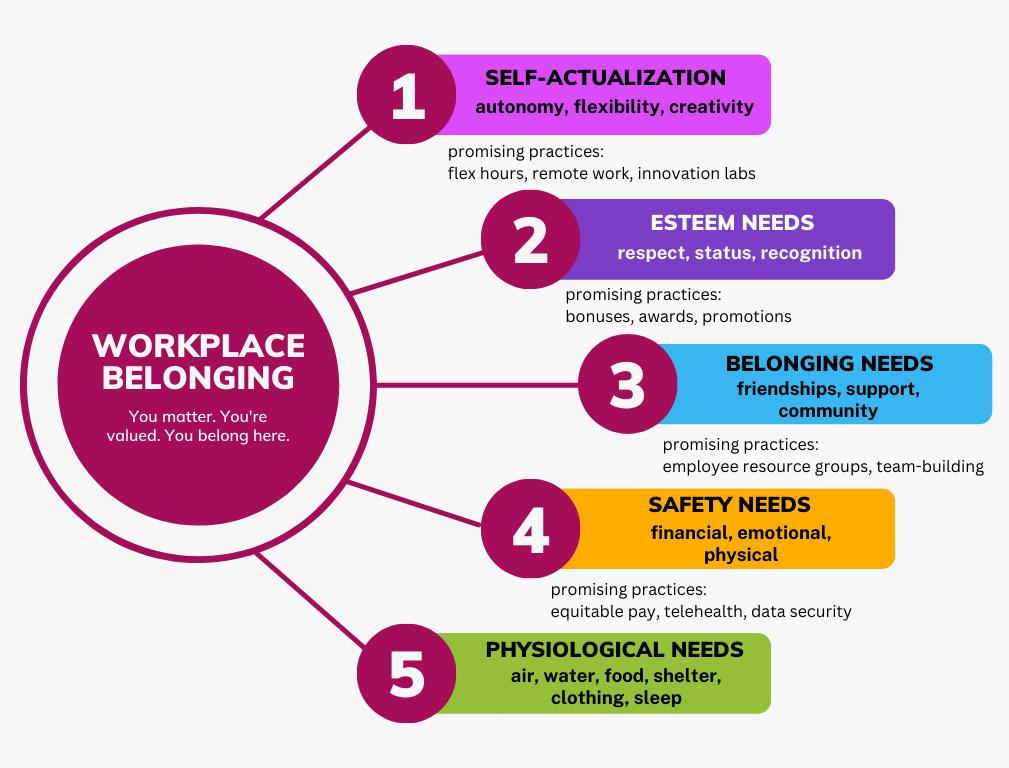
support staff at historically Black colleges and universities (HBCUs), and reduction in “sick leave days” at 4-year research universities, just to name a few. Figure 1 presents a graphical summary of such results.
Leaders in higher education can take several steps—that is, deliberate actions— to boost workplace belonging for all of their employees. This was the focus of several recent keynote lectures and presentations at professional associations and campuses across the nation, including without limitation: Virginia Commonwealth University, William & Mary, and the Virginia Association of Diversity Officers in Higher Education (VADOHE). In each of these
95 Higher Education Digest September 2023
[Workplace belonging model. Image created by author; do not duplicate or reproduce without permission]
invited public talks and discussions, I addressed key points about workplace belonging, how it’s different from related concepts (e.g., equity, diversity), and practical steps campus leaders can take to create conditions where every employee feels like they matter and belong at work. Here are a few highlights that map onto the model shown below (see Figure 2):
● Sense of belonging is a basic human need and people yearn to feel like they belong at home, school, and work;
● Work is an important aspect of life but it’s not the only part of people’s lives. People are looking for employers who understand this fact and demonstrate that understanding in the workplace, especially in a post-pandemic “new normal” where everyone’s keenly aware that time is precious and tomorrow’s not promised;
● Workplace belonging produces measurable, positive, and significant gains and empowers employees for “big wins” but it doesn’t always require BIG steps, major leaps, or mind-blowing financial investments—employers can produce macro-gains through micro-actions that boost workplace belonging.
To facilitate workplace belonging in higher education, human resource talent management (HRTM) leaders can make concerted efforts to advocate for diversity in the workplace and ensure that hiring practices are inclusive. In addition, campus leaders can help to cultivate a welcoming culture by providing high-quality on-boarding and orientation for all new hires, organizing regularly-scheduled activities geared toward team building, encouraging open and honest communication, inviting input from staff, and actively involving employees in the process of making important decisions.
Team leaders—including cabinet members, deans, department heads, and directors— should make it a priority to cultivate strong personal connections with their employees, create opportunities for mentoring, and provide consistent growth-minded feedback and career coaching. Other promising practices that seem to boost workplace belonging include:
● Using current or new reward structures to celebrate the contributions, talents, and skills of staff and/or teams, which signals to employees that their work matters and contributions are valued.
● Investing in staff development opportunities ranging from in-house workshops to online webinars, microcredentials, and conference attendance/participation, which signals to employees that employers care about them and their career success, addressing findings from a recent survey that found 74% of employees identified “lack of professional development” as a barrier to reaching their full potential and 94% of them said they would stay longer at their place of employment if the company invested in staff development;
● Offering flexibility in terms of work, whether one works full-time, part-time, or contractually. Options vary but include remote work, flex time, educational- and/or parental leave, education benefits, and 4-day work weeks.
Building a culture of belonging in higher education calls for continuous commitment and hard work, but the benefits of such an environment far outweigh the cost. When institutions commit to fostering a sense of belonging for staff, they satisfy employees’ needs and raise productivity, which, in turn, contributes to the overall success of the organization. It’s literally a “win-win” situation for all.
96 Higher Education Digest September 2023
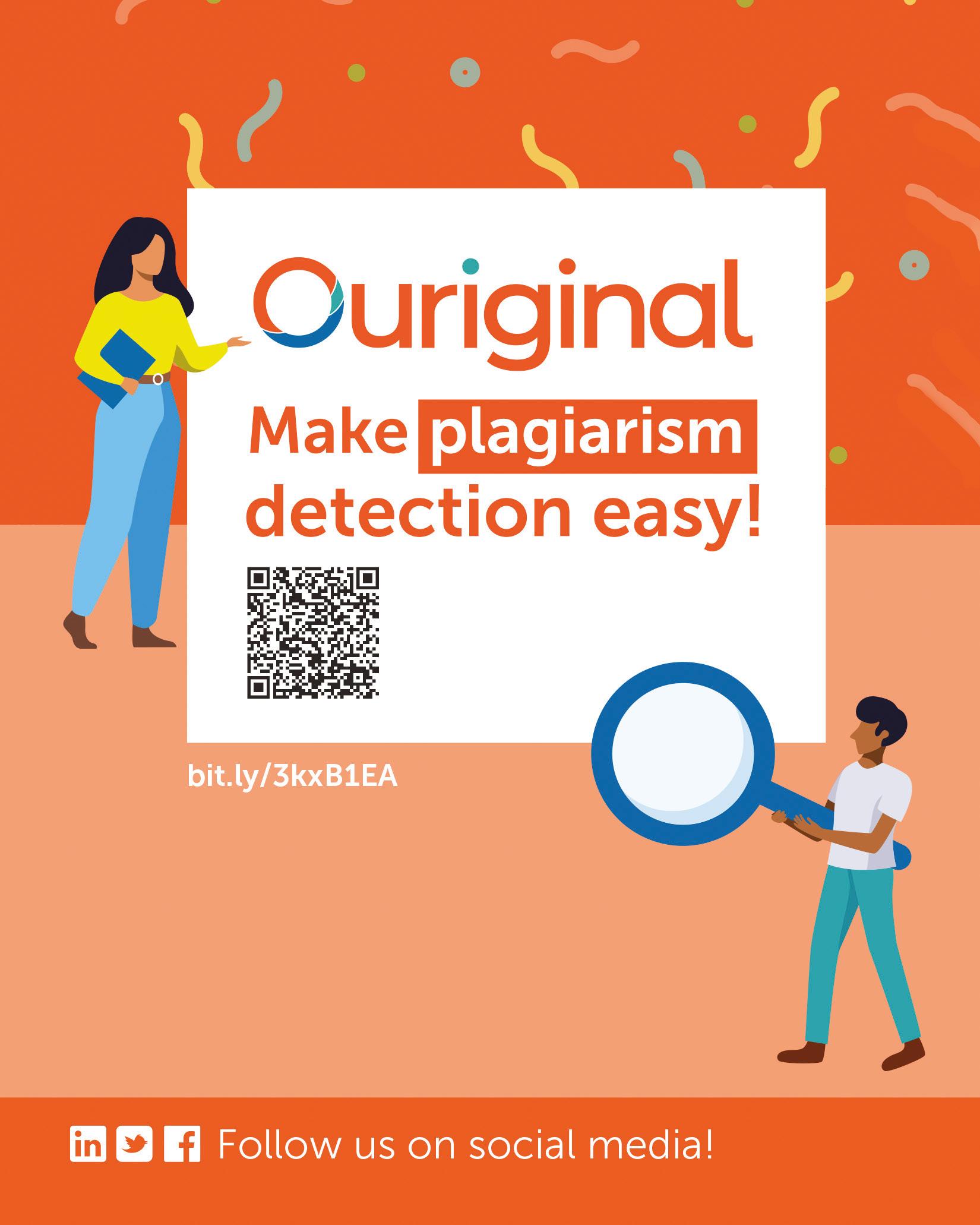
Higher Education Digest September 2023 Higher Education Digest October 2021
























































































































